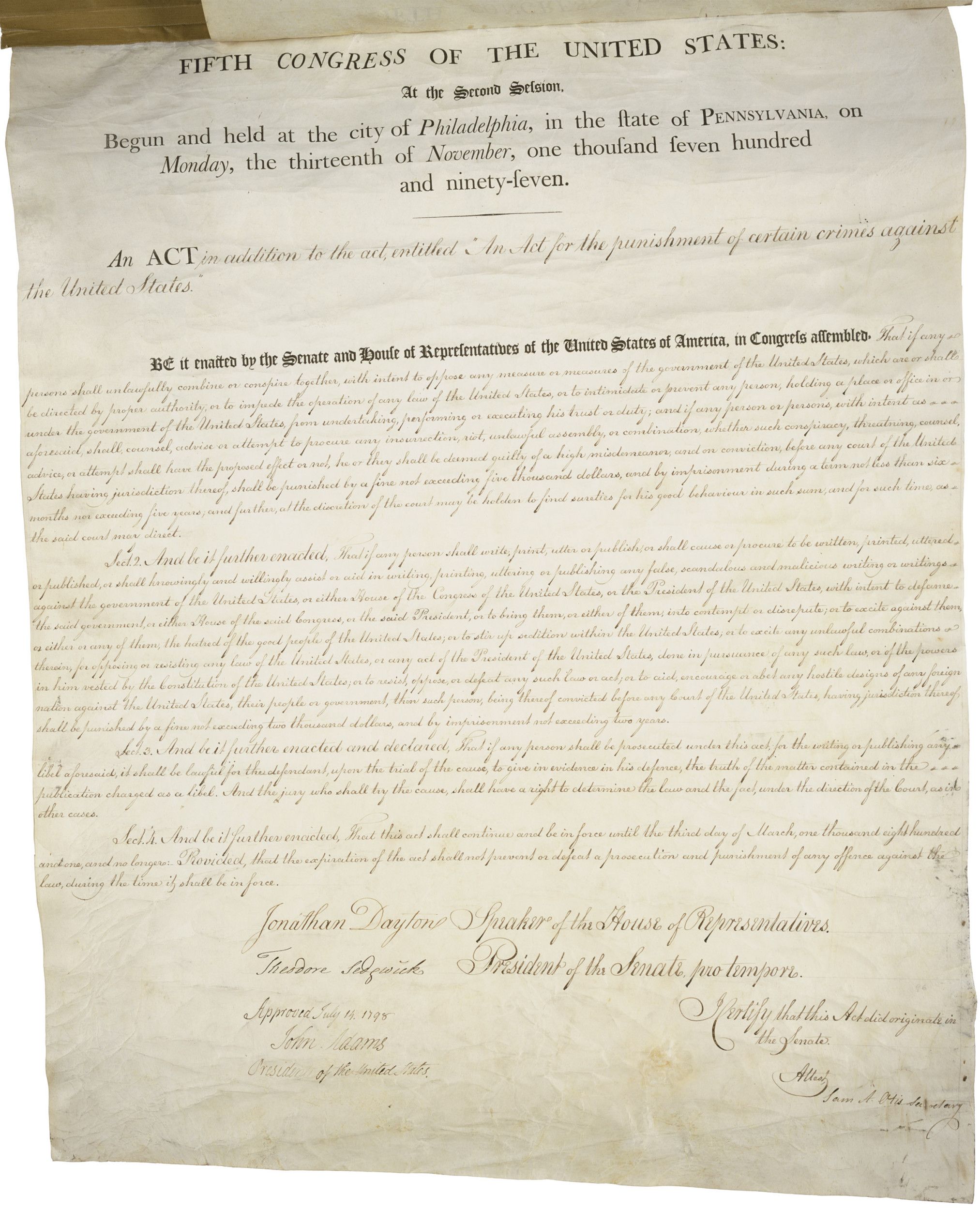The First Amendment
Seeing the Big Picture
All documents and text associated with this activity are printed below, followed by a worksheet for student responses.Introduction
The Bill of Rights comprises the first 10 amendments to the U.S. Constitution. The rights detailed in these amendments were intended to protect us from the abuse of government power and are at the core of what we know as American democracy. You will have the opportunity to explore the First Amendment with this activity.Examine each document carefully. Then match each document with the specific phrase of the First Amendment that it best demonstrates.
Name:
Class:
Class:
Worksheet
The First Amendment
Seeing the Big Picture
Examine the documents and text included in this activity. Consider how each document or piece of text relates to each other and create matched pairs. Write the text or document number next to its match below. Write your conclusion response in the space provided.1
2
3
4
5
6
1
Activity Element
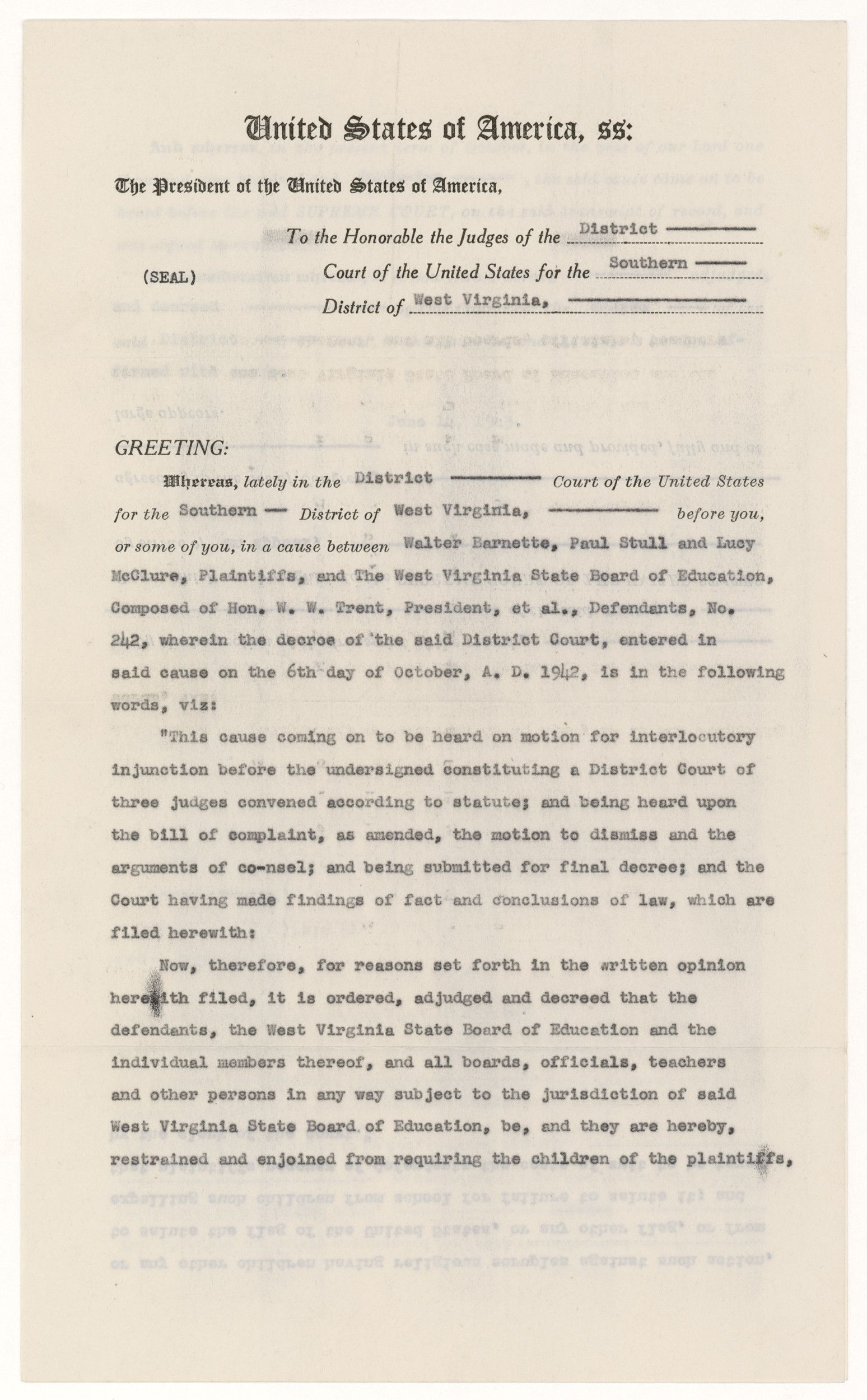
2
Activity Element
Congress shall make no law respecting an establishment of religion
3
Activity Element
Congress shall make no law abridging the right of the people to peaceably to assemble
4
Activity Element
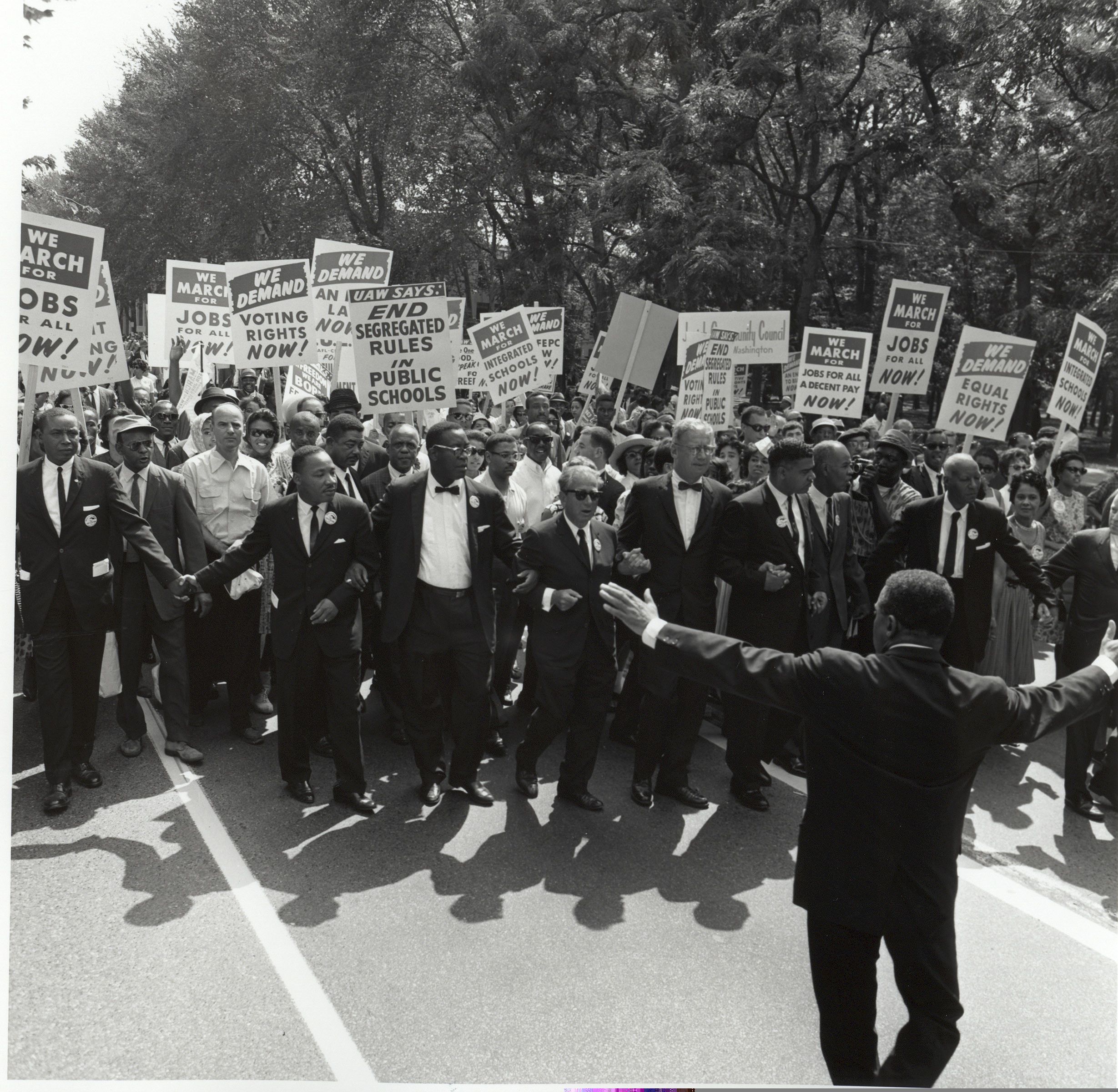
5
Activity Element
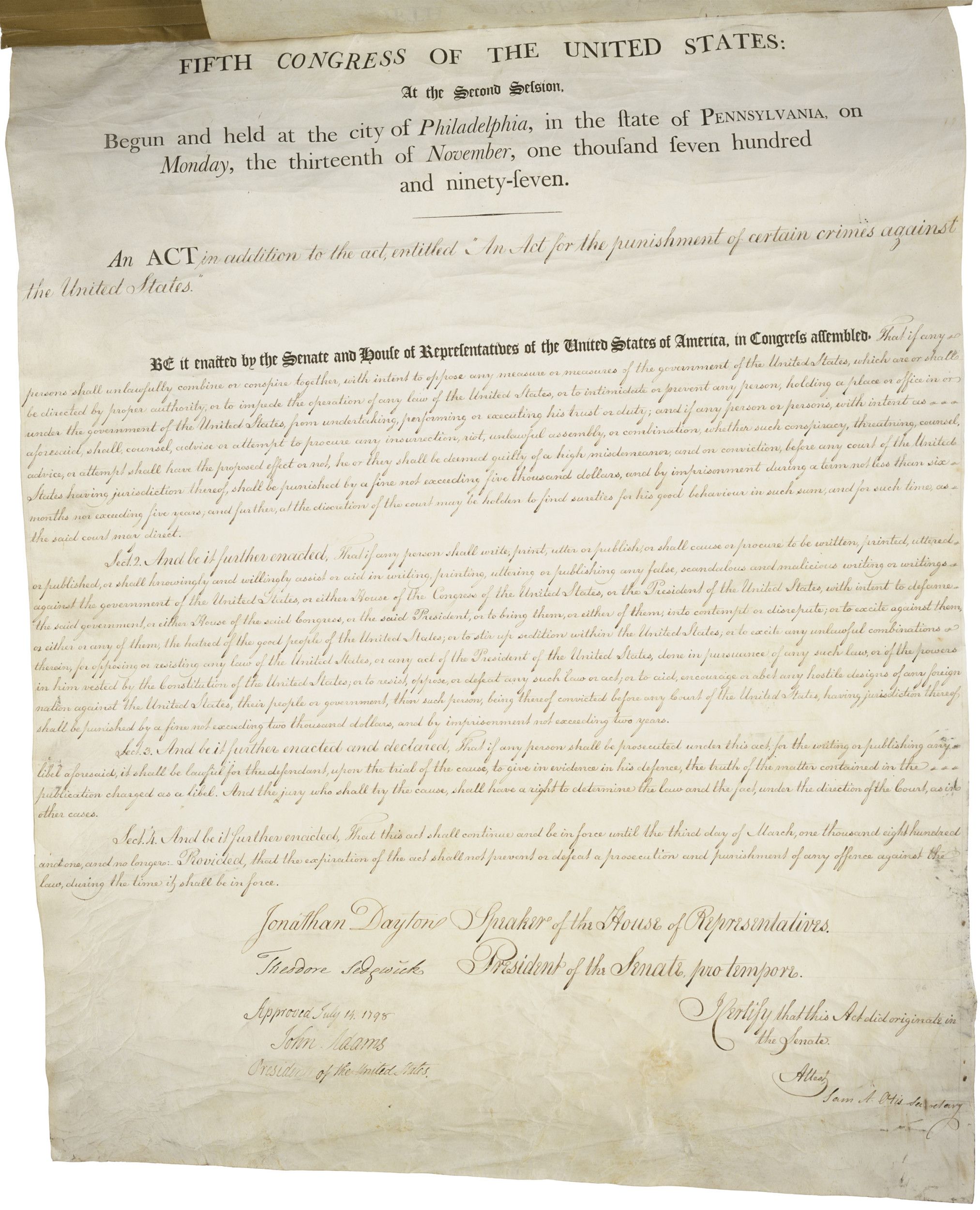
6
Activity Element
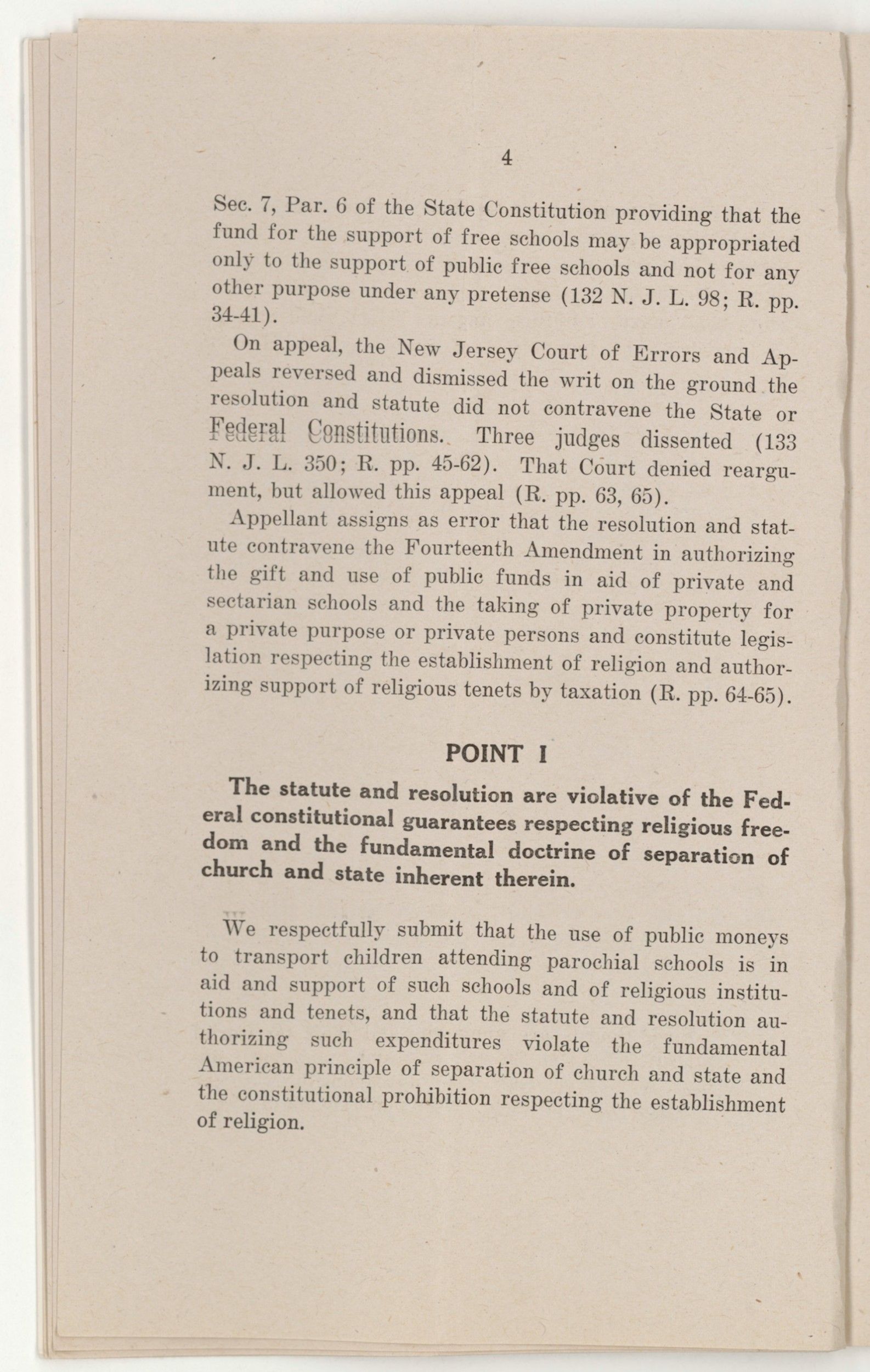
7
Activity Element
Congress shall make no law abriding the right of the people to petition the Government for a redress of grievances
8
Activity Element
Congress shall make no law prohibiting the free exercise of religion
9
Activity Element
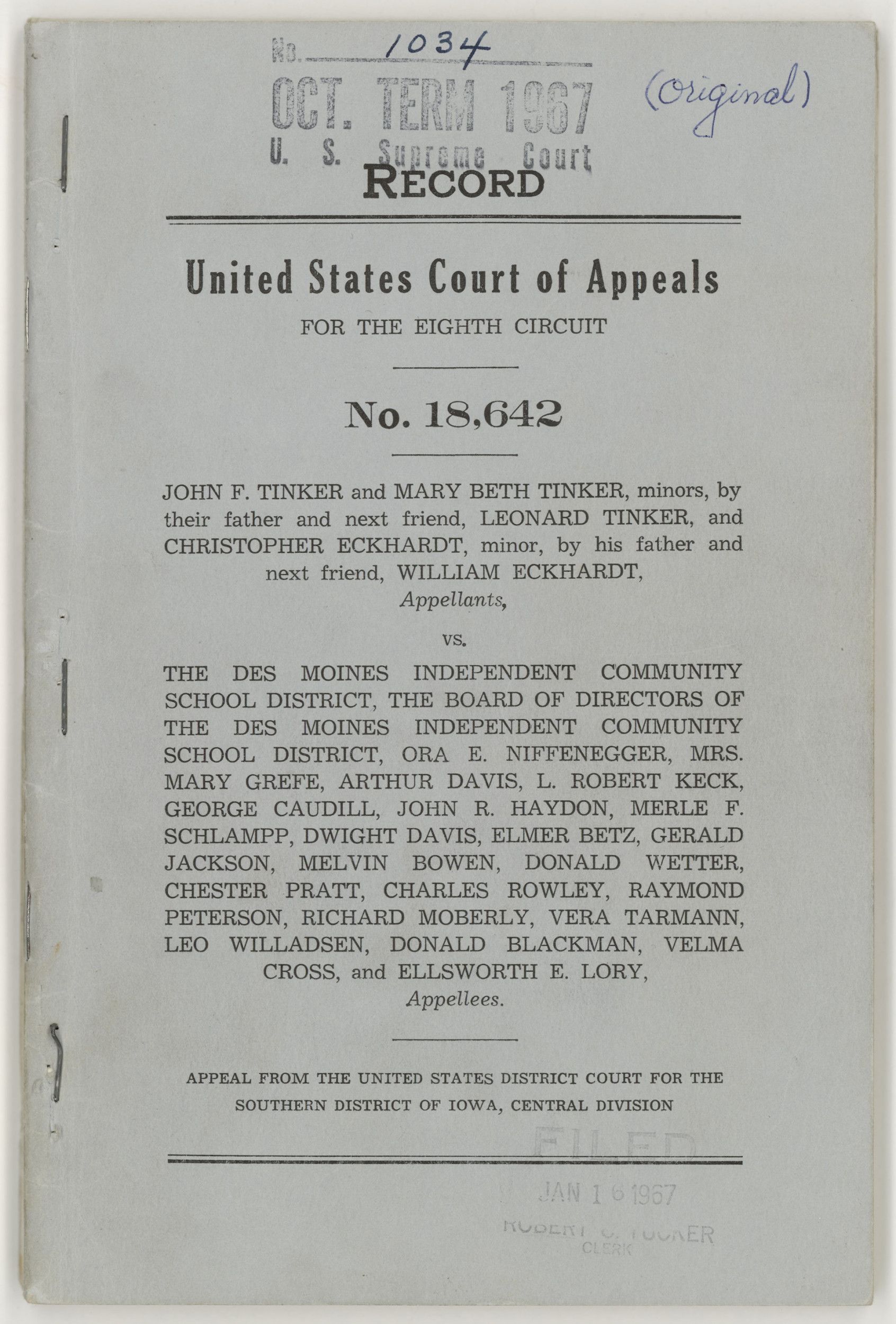
10
Activity Element
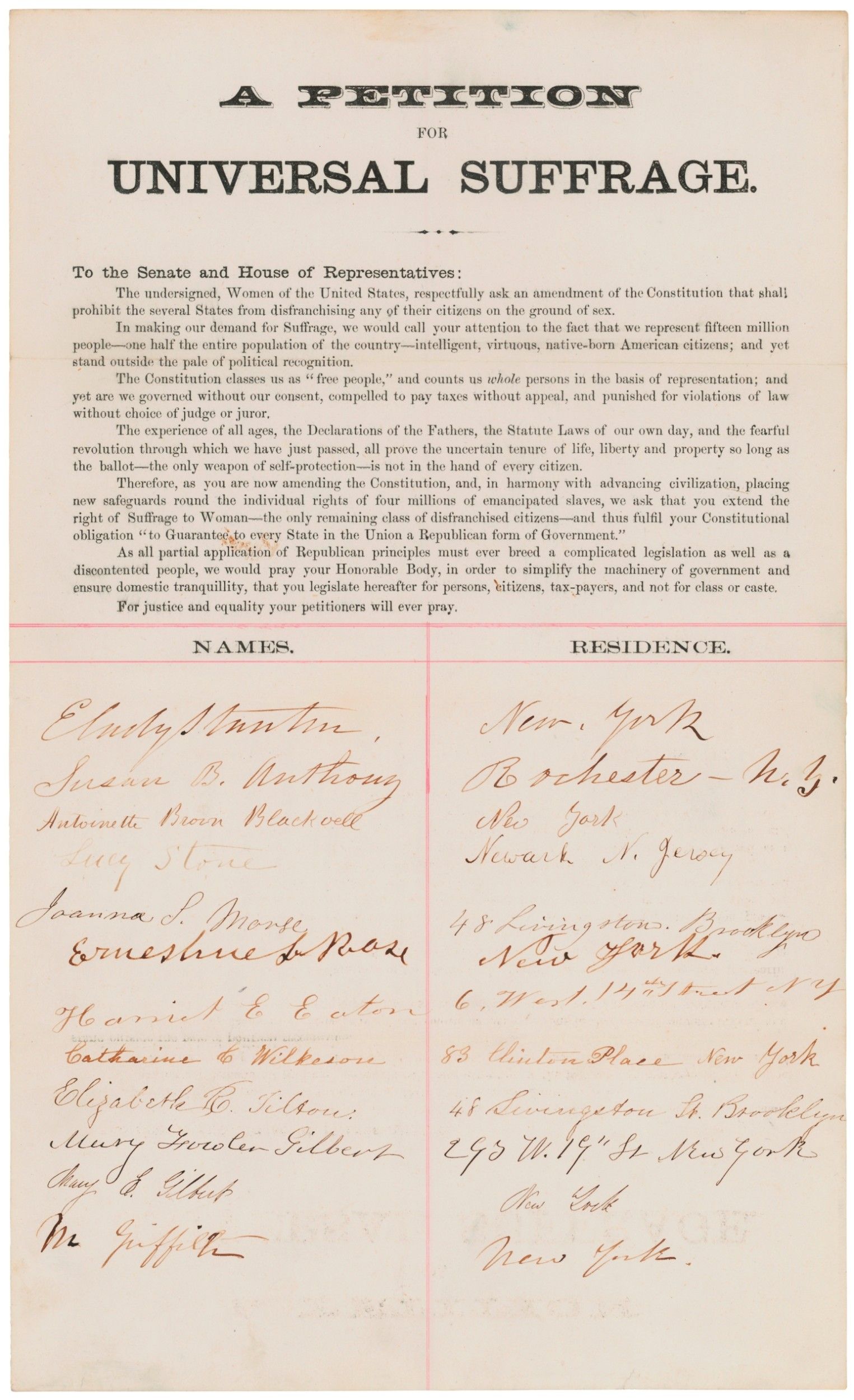
11
Activity Element
Congress shall make no law abridging the freedom of the press
12
Activity Element
Congress shall make no law abridging the freedom of speech
Culminating Document
Bill of Rights
9/25/1789
This document is the Federal Government's official copy of the joint resolution of Congress proposing the original Bill of Rights, engrossed on parchment. (Engrossing is the process of copying an official document in a large hand.) It is signed by Frederick Augustus Muhlenberg, Speaker of the House of Representatives, and John Adams, Vice President of the United States and President of the Senate.
The amendments proposed in the Bill of Rights defined citizens' rights in relation to the newly established government under the new United States Constitution. During the debates on the adoption of the Constitution, its opponents repeatedly charged that the Constitution as drafted would open the way to tyranny by the central government.
Fresh in their minds was the memory of the British violation of civil rights before and during the Revolution. They demanded a "bill of rights" that would spell out the immunities of individual citizens. Several state conventions, in their formal ratification of the Constitution, asked for such amendments; others ratified the Constitution with the understanding that the amendments would be offered.
The First Federal Congress took up the matter and proposed 12 articles to the states for ratification on September 25, 1789. (This document shows those 12.) Ten of the 12 proposed amendments were ratified by three-fourths of the states to become part the Constitution.
Articles 3 to 12, ratified December 15, 1791, constitute the first 10 amendments of the Constitution (what are commonly referred to as the Bill of Rights). Article 2 concerning "varying the compensation for the services of the Senators and Representatives" was finally ratified on May 7, 1992 as the 27th Amendment to the Constitution. Article 1, that concerns the number of constituents for each Representative, was never ratified.
The amendments proposed in the Bill of Rights defined citizens' rights in relation to the newly established government under the new United States Constitution. During the debates on the adoption of the Constitution, its opponents repeatedly charged that the Constitution as drafted would open the way to tyranny by the central government.
Fresh in their minds was the memory of the British violation of civil rights before and during the Revolution. They demanded a "bill of rights" that would spell out the immunities of individual citizens. Several state conventions, in their formal ratification of the Constitution, asked for such amendments; others ratified the Constitution with the understanding that the amendments would be offered.
The First Federal Congress took up the matter and proposed 12 articles to the states for ratification on September 25, 1789. (This document shows those 12.) Ten of the 12 proposed amendments were ratified by three-fourths of the states to become part the Constitution.
Articles 3 to 12, ratified December 15, 1791, constitute the first 10 amendments of the Constitution (what are commonly referred to as the Bill of Rights). Article 2 concerning "varying the compensation for the services of the Senators and Representatives" was finally ratified on May 7, 1992 as the 27th Amendment to the Constitution. Article 1, that concerns the number of constituents for each Representative, was never ratified.
Transcript
Congress of the United Statesbegun and held at the City of New-York, on
Wednesday the fourth of March, one thousand seven hundred and eighty nine.
THE Conventions of a number of the States, having at the time of their adopting the Constitution, expressed a desire, in order to prevent misconstruction or abuse of its powers, that further declaratory and restrictive clauses should be added: And as extending the ground of public confidence in the Government, will best ensure the beneficent ends of its institution.
RESOLVED by the Senate and House of Representatives of the United States of America, in Congress assembled, two thirds of both Houses concurring, that the following Articles be proposed to the Legislatures of the several States, as amendments to the Constitution of the United States, all, or any of which Articles, when ratified by three fourths of the said Legislatures, to be valid to all intents and purposes, as part of the said Constitution; viz.
ARTICLES in addition to, and Amendment of the Constitution of the United States of America, proposed by Congress, and ratified by the Legislatures of the several States, pursuant to the fifth Article of the original Constitution.
Article the first... After the first enumeration required by the first article of the Constitution, there shall be one Representative for every thirty thousand, until the number shall amount to one hundred, after which the proportion shall be so regulated by Congress, that there shall be not less than one hundred Representatives, nor less than one Representative for every forty thousand persons, until the number of Representatives shall amount to two hundred; after which the proportion shall be so regulated by Congress, that there shall not be less than two hundred Representatives, nor more than one Representative for every fifty thousand persons.
Article the second... No law, varying the compensation for the services of the Senators and Representatives, shall take effect, until an election of Representatives shall have intervened.
Article the third... Congress shall make no law respecting an establishment of religion, or prohibiting the free exercise thereof; or abridging the freedom of speech, or of the press; or the right of the people peaceably to assemble, and to petition the Government for a redress of grievances.
Article the fourth... A well regulated Militia, being necessary to the security of a free State, the right of the people to keep and bear Arms, shall not be infringed.
Article the fifth... No Soldier shall, in time of peace be quartered in any house, without the consent of the Owner, nor in time of war, but in a manner to be prescribed by law.
Article the sixth... The right of the people to be secure in their persons, houses, papers, and effects, against unreasonable searches and seizures, shall not be violated, and no Warrants shall issue, but upon probable cause, supported by Oath or affirmation, and particularly describing the place to be searched, and the persons or things to be seized.
Article the seventh... No person shall be held to answer for a capital, or otherwise infamous crime, unless on a presentment or indictment of a Grand Jury, except in cases arising in the land or naval forces, or in the Militia, when in actual service in time of War or public danger; nor shall any person be subject for the same offence to be twice put in jeopardy of life or limb; nor shall be compelled in any criminal case to be a witness against himself, nor be deprived of life, liberty, or property, without due process of law; nor shall private property be taken for public use, without just compensation.
Article the eighth... In all criminal prosecutions, the accused shall enjoy the right to a speedy and public trial, by an impartial jury of the State and district wherein the crime shall have been committed, which district shall have been previously ascertained by law, and to be informed of the nature and cause of the accusation; to be confronted with the witnesses against him; to have compulsory process for obtaining witnesses in his favor, and to have the Assistance of Counsel for his defence.
Article the ninth... In suits at common law, where the value in controversy shall exceed twenty dollars, the right of trial by jury shall be preserved, and no fact tried by a jury, shall be otherwise re-examined in any Court of the United States, than according to the rules of the common law.
Article the tenth... Excessive bail shall not be required, nor excessive fines imposed, nor cruel and unusual punishments inflicted.
Article the eleventh... The enumeration in the Constitution, of certain rights, shall not be construed to deny or disparage others retained by the people.
Article the twelfth... The powers not delegated to the United States by the Constitution, nor prohibited by it to the States, are reserved to the States respectively, or to the people.
ATTEST,
Frederick Augustus Muhlenberg, Speaker of the House of Representatives
John Adams, Vice-President of the United States, and President of the Senate
John Beckley, Clerk of the House of Representatives.
Sam. A Otis Secretary of the Senate
This primary source comes from the General Records of the United States Government.
National Archives Identifier: 1408042
Full Citation: Bill of Rights; 9/25/1789; Enrolled Acts and Resolutions of Congress, 1789 - 2011; General Records of the United States Government, ; National Archives Building, Washington, DC. [Online Version, https://docsteach.org/documents/document/bill-of-rights, April 20, 2024]Bill of Rights
Page 1
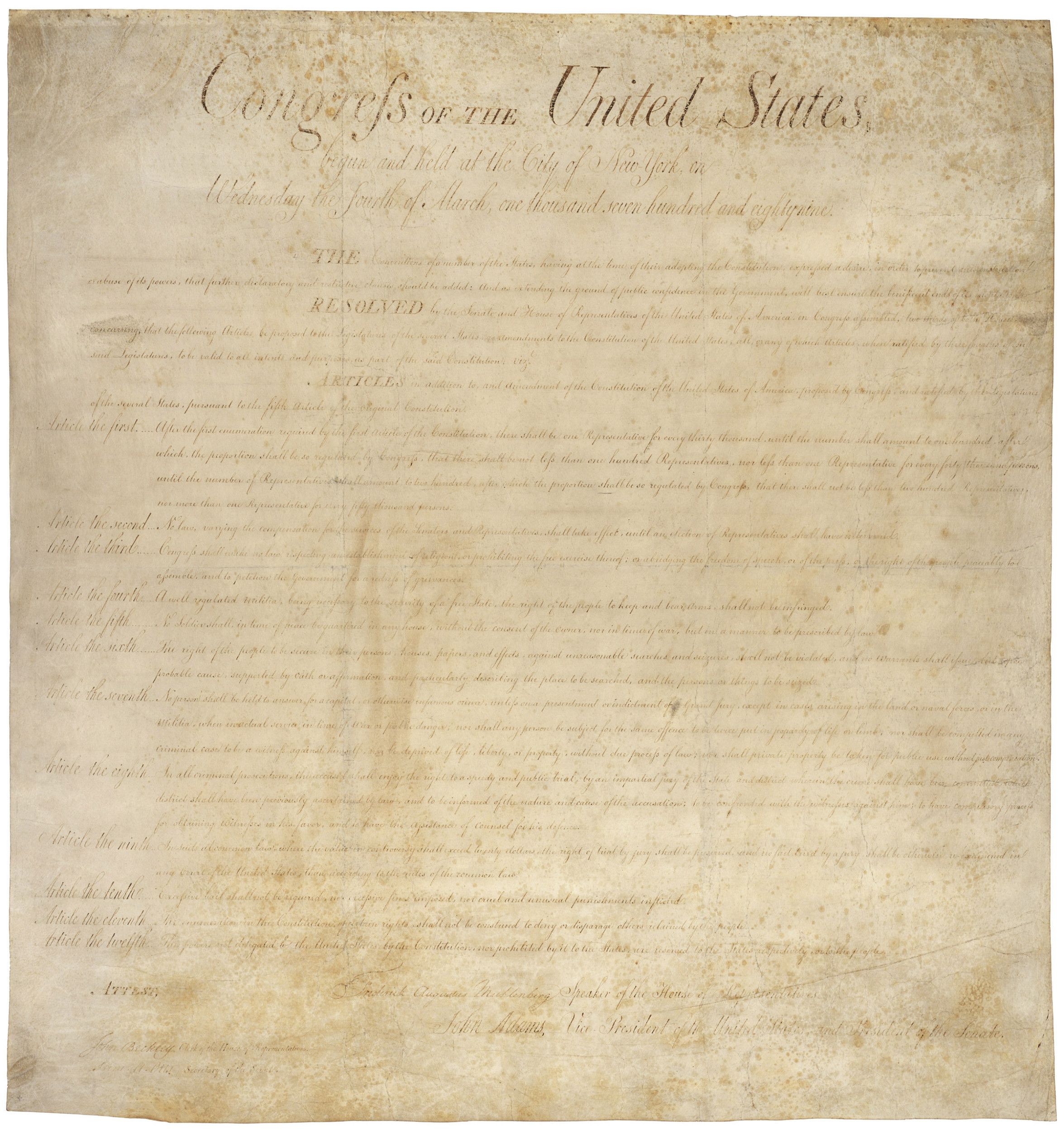
Conclusion
The First Amendment
Seeing the Big Picture
Consider the following questions and the documents you examined. Be prepared to discuss them aloud as a class.- Do you think First Amendment rights were violated?
- Which documents lead you to wonder what happened next?
Your Response
Document
Photograph of Leaders at the Head of the Civil Rights March on Washington, D.C.
8/28/1963
Civil rights leaders Rev. Dr. Martin Luther King, Jr., (front row, second from left), A. Philip Randolph (front row, far right), and Roy Wilkins (front row, second from right) lead the March on Washington for Jobs and Freedom on August 28, 1963.
This primary source comes from the Records of the U.S. Information Agency.
National Archives Identifier: 542002
Full Citation: Photograph of Leaders at the Head of the Civil Rights March on Washington, D.C.; 8/28/1963; Miscellaneous Subjects, Staff and Stringer Photographs, 1961–1974; Records of the U.S. Information Agency, ; National Archives at College Park, College Park, MD. [Online Version, https://docsteach.org/documents/document/photograph-of-leaders-at-the-head-of-the-civil-rights-march-on-washington-dc, April 20, 2024]Photograph of Leaders at the Head of the Civil Rights March on Washington, D.C.
Page 1
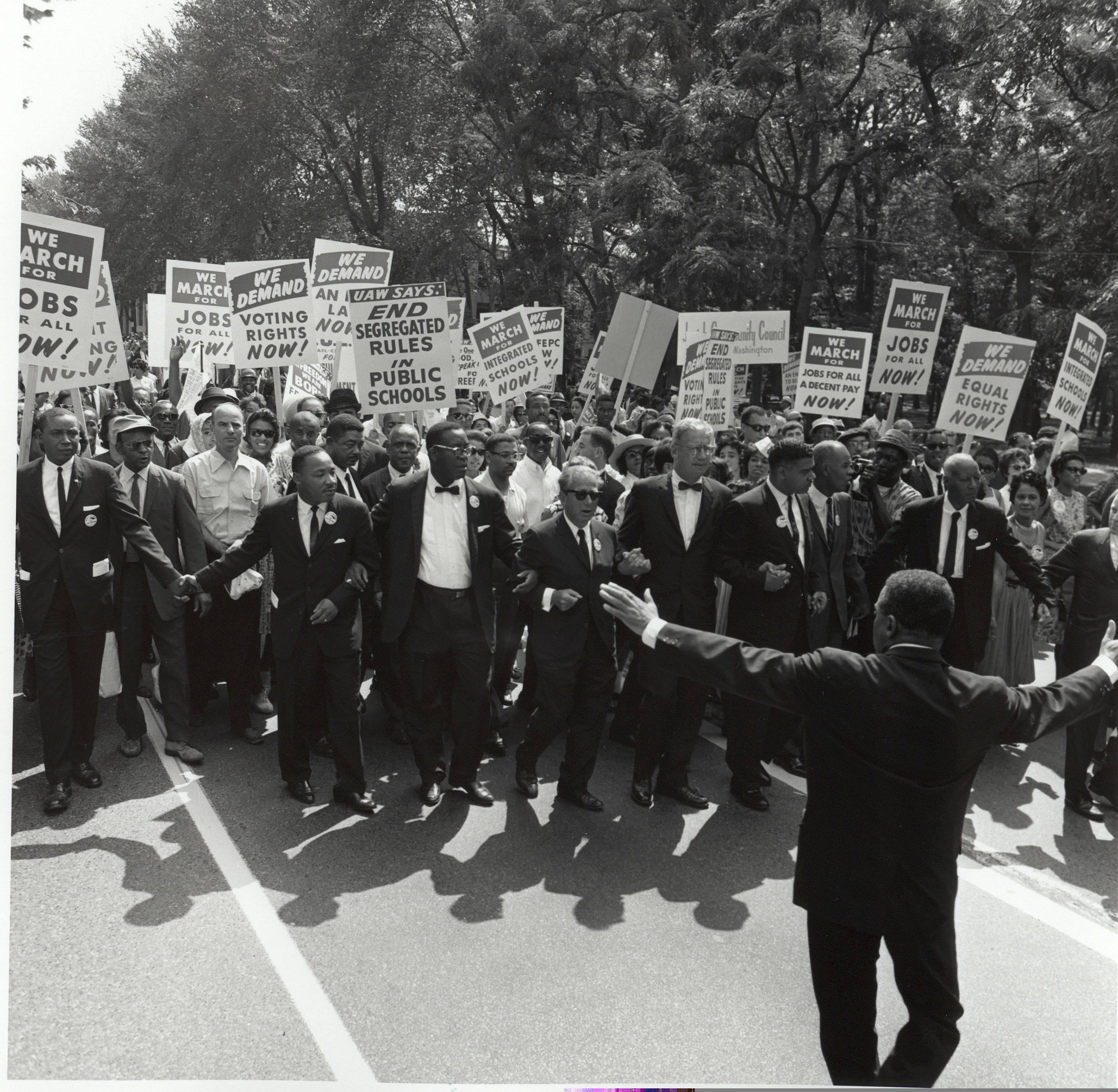
Document
Petition Asking for an Amendment of the Constitution that Shall Prohibit the Several States from Disfranchising Any of Their Citizens on the Ground of Sex
1/29/1866
Declaring “we are governed without our consent,” this petition was part of the first national drive to focus on women’s voting rights and includes signatures of some of the most prominent advocates at the time: Susan B. Anthony, Elizabeth Cady Stanton, Ernestine Rose, Lucy Stone, and Antoinette Brown Blackwell. It asks for an amendment to the Constitution that shall prohibit the several states from disfranchising any of their citizens on the grounds of sex.
Transcript
A PETITION FOR UNIVERSAL SUFFRAGE.To the Senate and House of Representatives:
The undersigned, Women of the United States, respectfully ask an amendment of the Constitution that shall prohibit the several States from disfranchising any of their citizens on the ground of sex.
In making our demand for Suffrage, we would call your attention to the fact that we represent fifteen million people—one half of the entire population of the country—intelligent, virtuous, native-born American citizens; and yet stand outside the pale of political recognition.
The Constitution classes us as "free people," and counts us whole persons in the basis of representation; and yet are we governed without our consent, compelled to pay taxes without appeal, and punished for violations of law without choice of judge or juror.
The experience of all ages, the Declarations of the Fathers, the Statute Laws of our own day, and the fearful revolution through which we have just passed, all prove the uncertain tenure of life, liberty and property so long as the ballot—the only weapon of self-protection—is not in the hand of every citizen.
Therefore, as you are now amending the Constitution, and, in harmony with advancing civilization, placing new safeguards round the individual rights of four millions of emancipated slaves, we ask that you extend the right of Suffrage to Woman—the only remaining class of disfranchised citizens—and thus fulfill your Constitutional obligation "to Guarantee to every State in the Union a Republican form of Government."
As all partial application of Republican principles must ever breed a complicated legislation as well as a discontented people, we would pray your Honorable Body, in order to simplify the machinery of government and ensure domestic tranquillity, that you legislate hereafter for persons, citizens, tax-payers, and not for class or caste.
For justice and equality your petitioners will ever pray.
[List of names and residences]
E. Cady Stanton, New York
Susan B. Anthony, Rochester, NY
Antoinette Brown Blackwell, New York
Lucy Stone, Newark N. Jersey
Joanna P. Morse, 48 Livingston, Brooklyn
Ernestine L. Rose, New York
Harriet E. Eaton, 6 West 14th NY
Catharine C. Wilkeson, 83 Clinton Place New York
Elizabeth R. Tilton, 48 Livingston St. Brooklyn
Mary Fowler Gilbert, 293 W. 19" St New York
Mary E. Gilbert, New York
M. Griffith, New York
This primary source comes from the Records of the U.S. House of Representatives.
National Archives Identifier: 306684
Full Citation: Petition Asking for an Amendment of the Constitution that Shall Prohibit the Several States from Disfranchising Any of Their Citizens on the Ground of Sex; 1/29/1866; (HR 39A-H14.9); Petitions and Memorials, 1813 - 1968; Records of the U.S. House of Representatives, ; National Archives Building, Washington, DC. [Online Version, https://docsteach.org/documents/document/petition-prohibit-disfranchisement, April 20, 2024]Petition Asking for an Amendment of the Constitution that Shall Prohibit the Several States from Disfranchising Any of Their Citizens on the Ground of Sex
Page 1
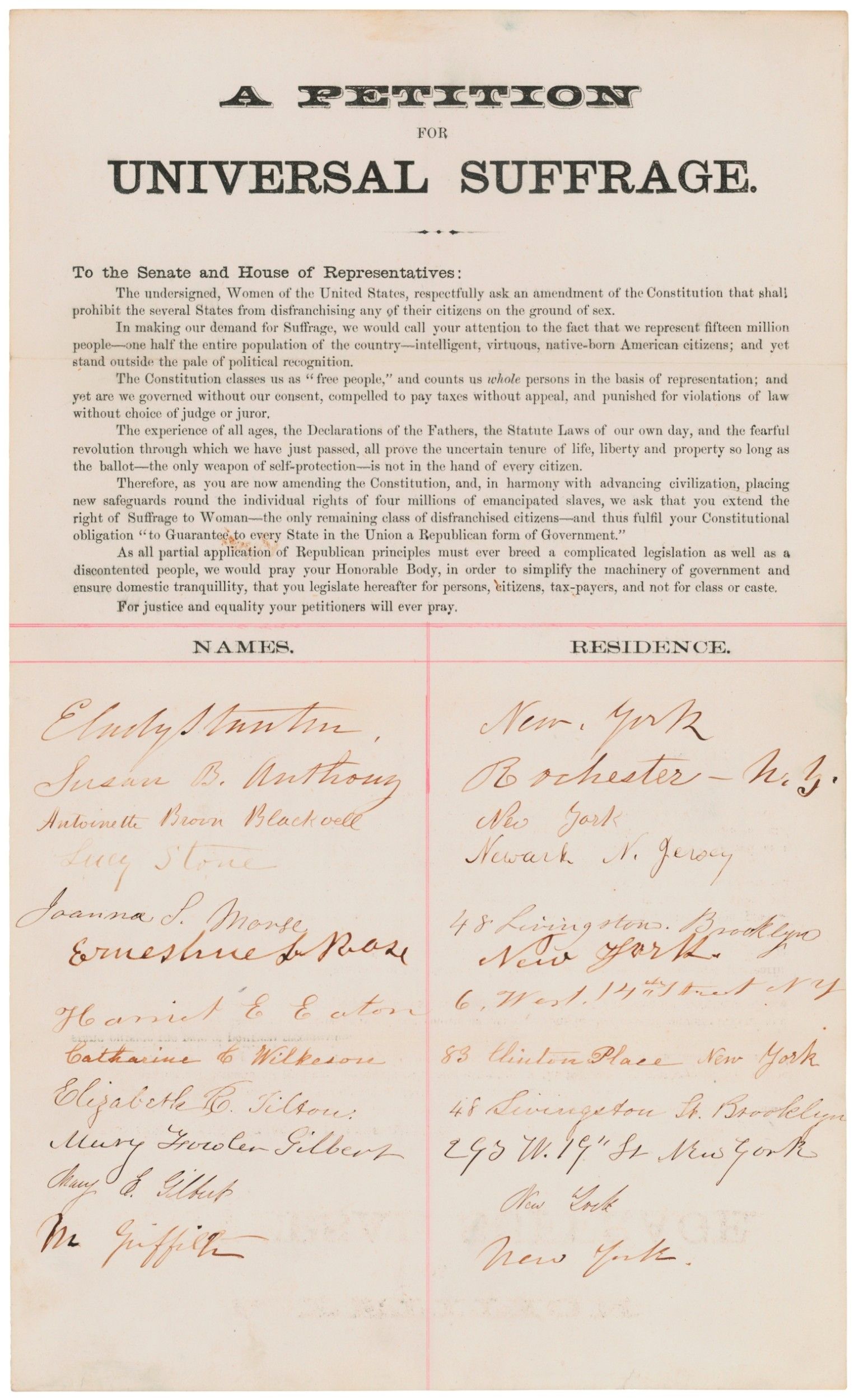
Document
Amicus Curiae Brief from the American Civil Liberties Union to the Supreme Court Regarding Everson v. Board of Education of Ewing Township, New Jersey
11/14/1946
This primary source comes from the Records of the Supreme Court of the United States.
National Archives Identifier: 5641609
Full Citation: Amicus Curiae Brief from the American Civil Liberties Union to the Supreme Court Regarding Everson v. Board of Education of Ewing Township, New Jersey; 11/14/1946; Records of the Supreme Court of the United States, . [Online Version, https://docsteach.org/documents/document/amicus-curiae-brief-from-the-american-civil-liberties-union-to-the-supreme-court-regarding-everson-v-board-of-education-of-ewing-township-new-jersey, April 20, 2024]Amicus Curiae Brief from the American Civil Liberties Union to the Supreme Court Regarding Everson v. Board of Education of Ewing Township, New Jersey
Page 1
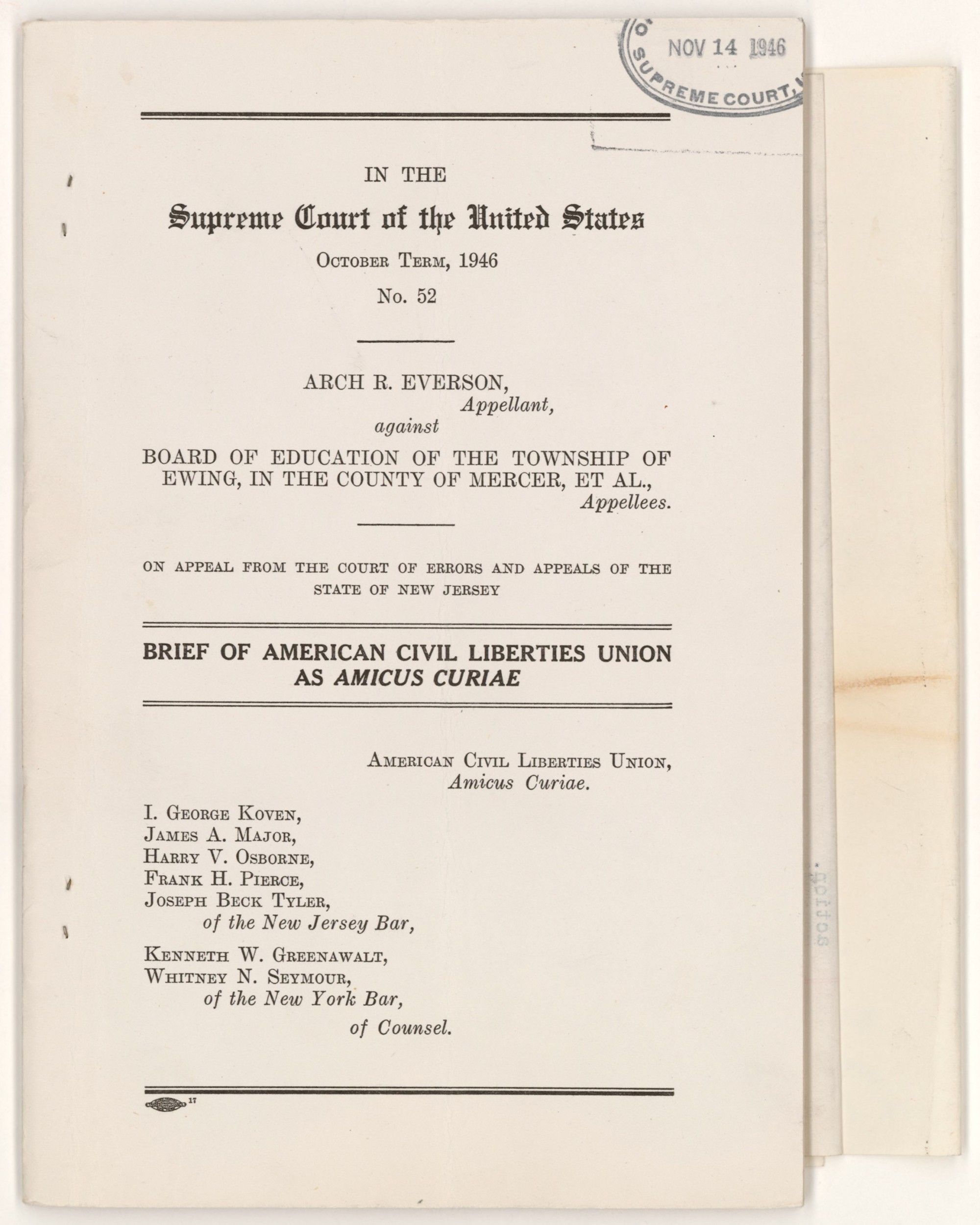
Amicus Curiae Brief from the American Civil Liberties Union to the Supreme Court Regarding Everson v. Board of Education of Ewing Township, New Jersey
Page 2
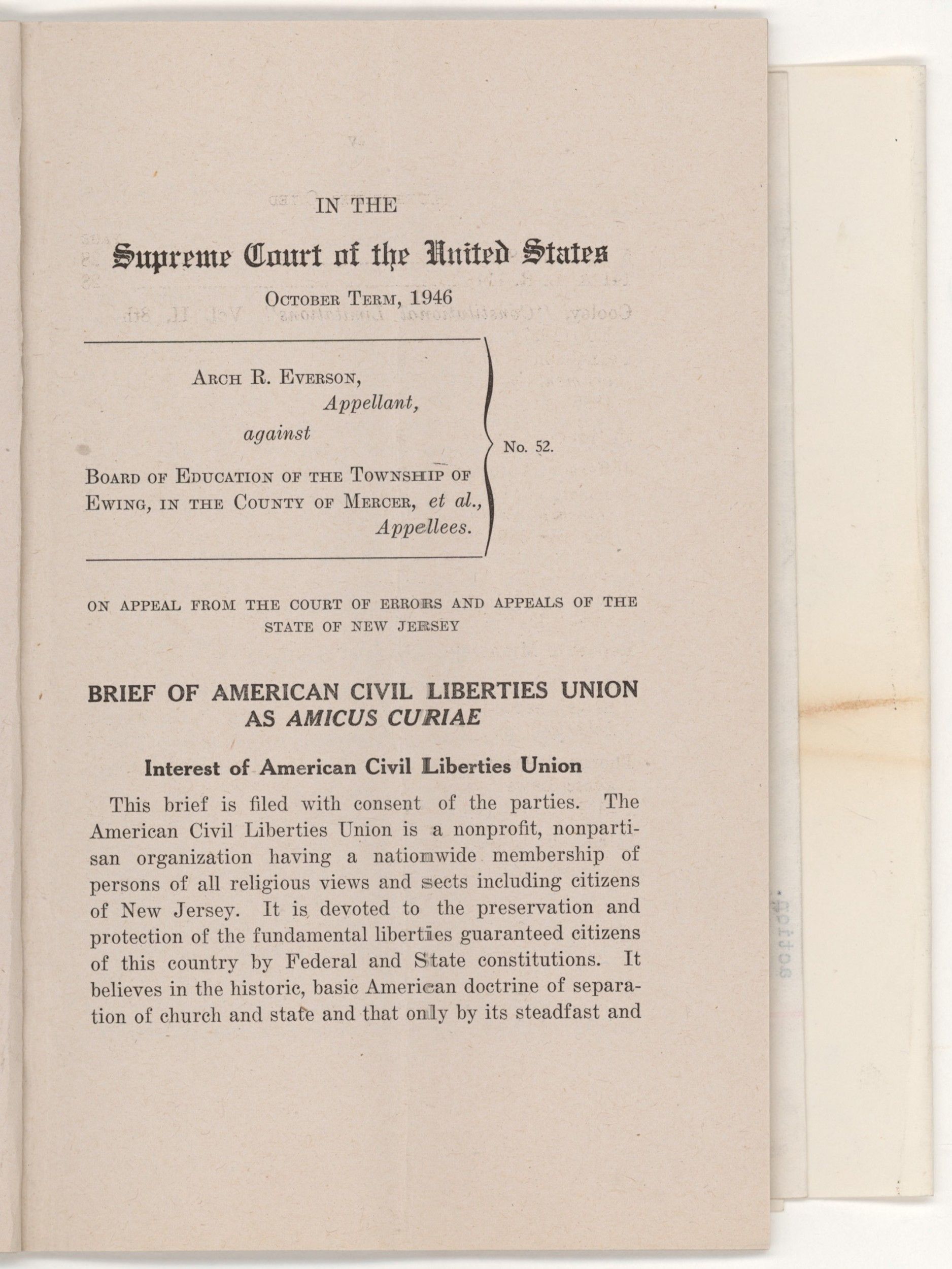
Amicus Curiae Brief from the American Civil Liberties Union to the Supreme Court Regarding Everson v. Board of Education of Ewing Township, New Jersey
Page 3
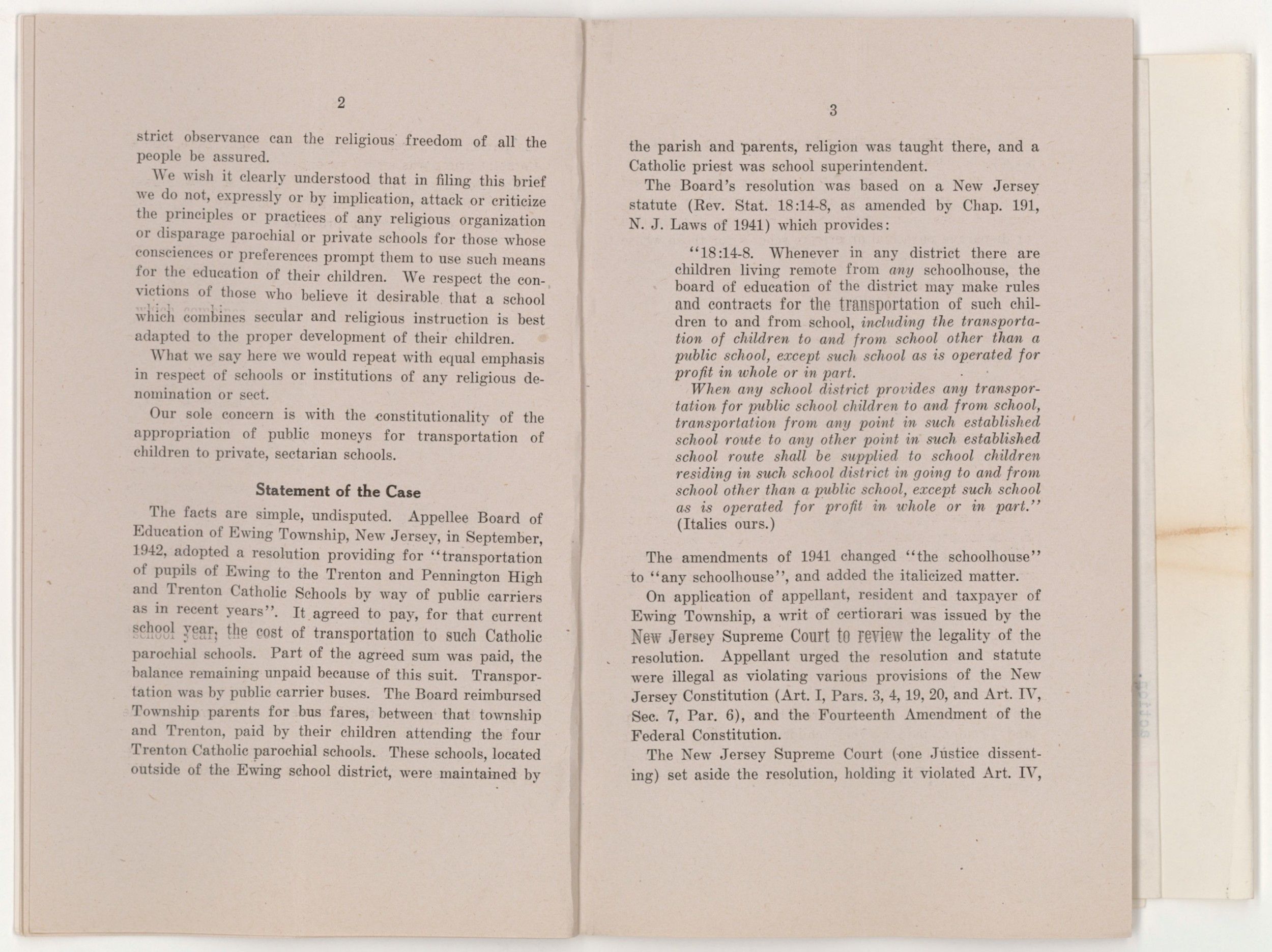
Amicus Curiae Brief from the American Civil Liberties Union to the Supreme Court Regarding Everson v. Board of Education of Ewing Township, New Jersey
Page 4
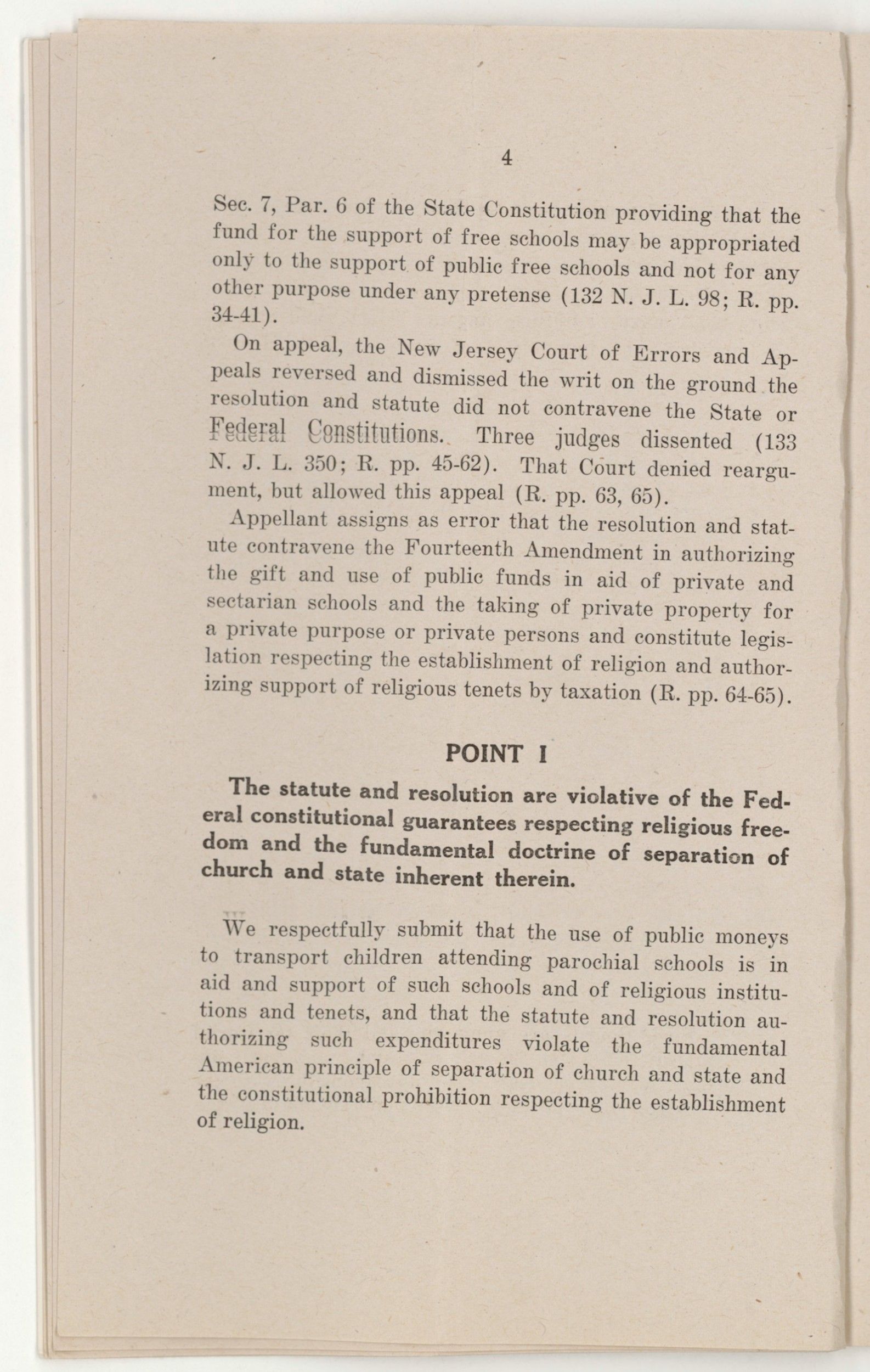
Document
Mandate in West Virginia v. Barnette
6/14/1943
The customs and laws governing the public recitation of the Pledge of Allegiance were not without opposition. The most notable objection came from the Jehovah's Witnesses, who opposed the salute on the grounds that it conflicted with their religious beliefs, especially those concerning idolatry. On Flag Day in 1943, the Supreme Court ruled in West Virginia v. Barnette that the First Amendment prohibits the state from compelling the flag salute. In the decision the Court stated in part: "If there is any fixed star in our constitutional constellation, it is that no official, high or petty, can prescribe what shall be orthodox in politics, nationalism, religion, or other matters of opinion or force citizens to confess by word or act their faith therein, If there are any circumstances which permit an exception, they do not now occur to us."
This primary source comes from the Records of the Supreme Court of the United States.
National Archives Identifier: 5641611
Full Citation: Mandate in West Virginia v. Barnette; 6/14/1943; Records of the Supreme Court of the United States, . [Online Version, https://docsteach.org/documents/document/mandate-in-west-virginia-v-barnette, April 20, 2024]Mandate in West Virginia v. Barnette
Page 1
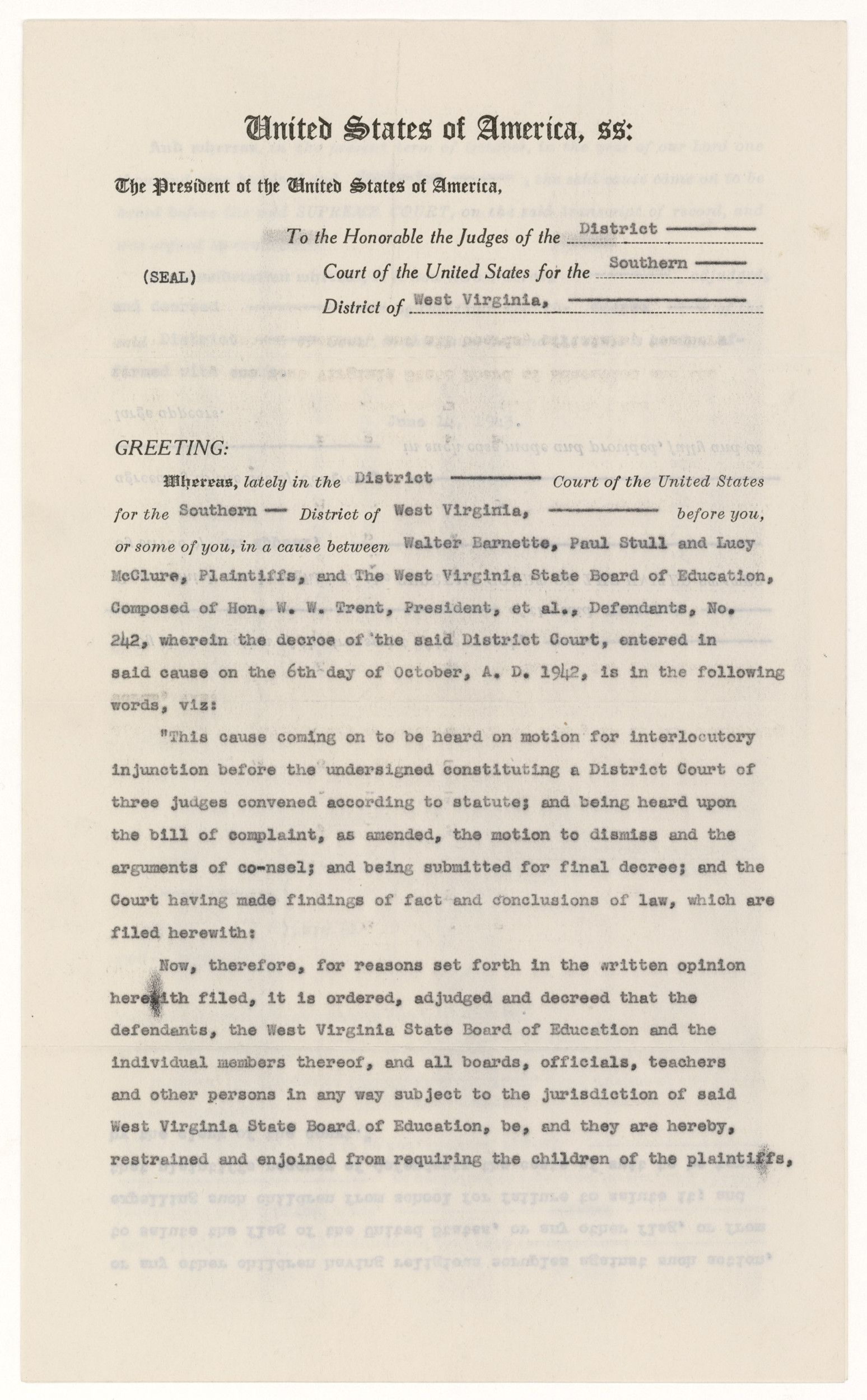
Mandate in West Virginia v. Barnette
Page 2
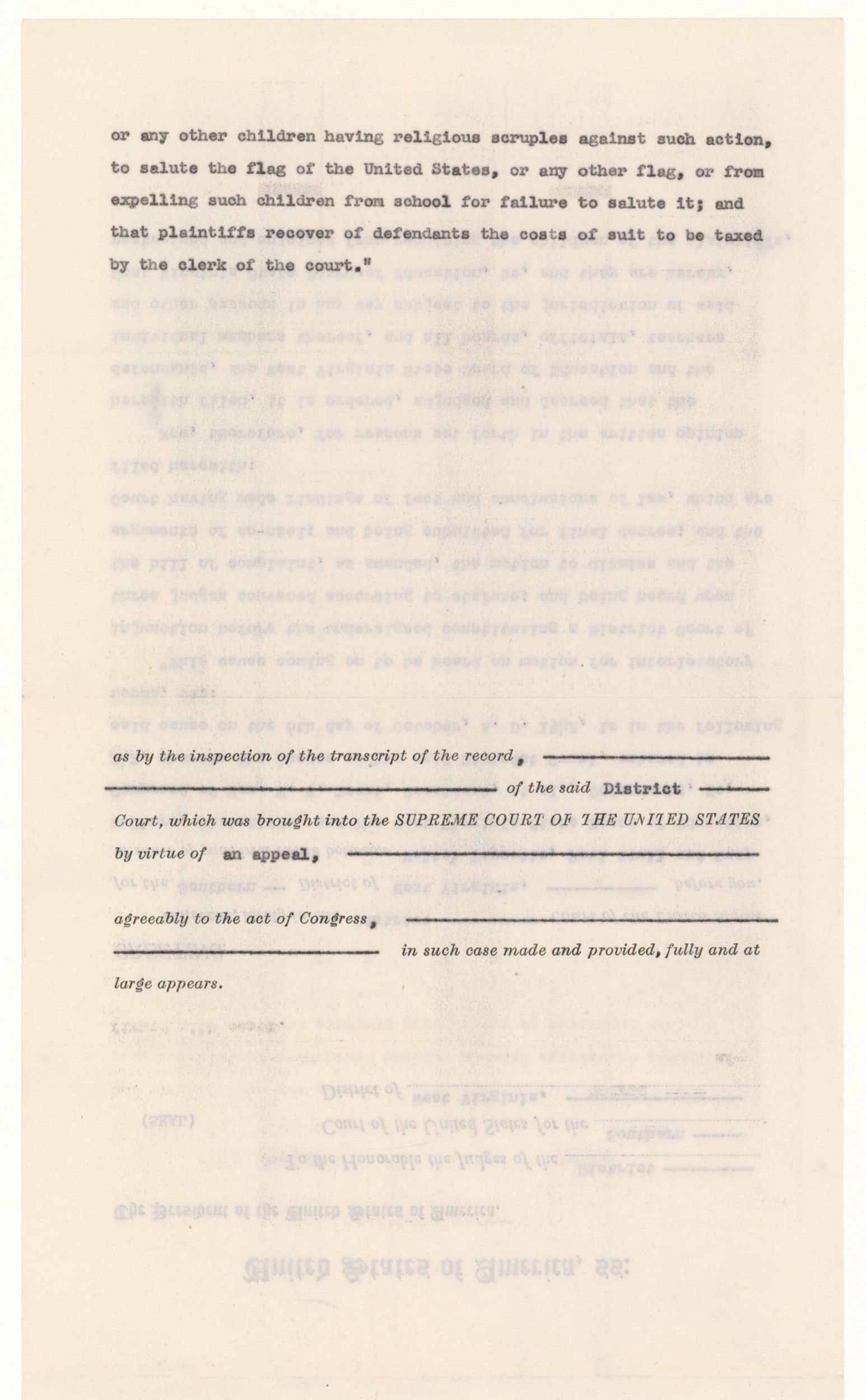
Mandate in West Virginia v. Barnette
Page 3
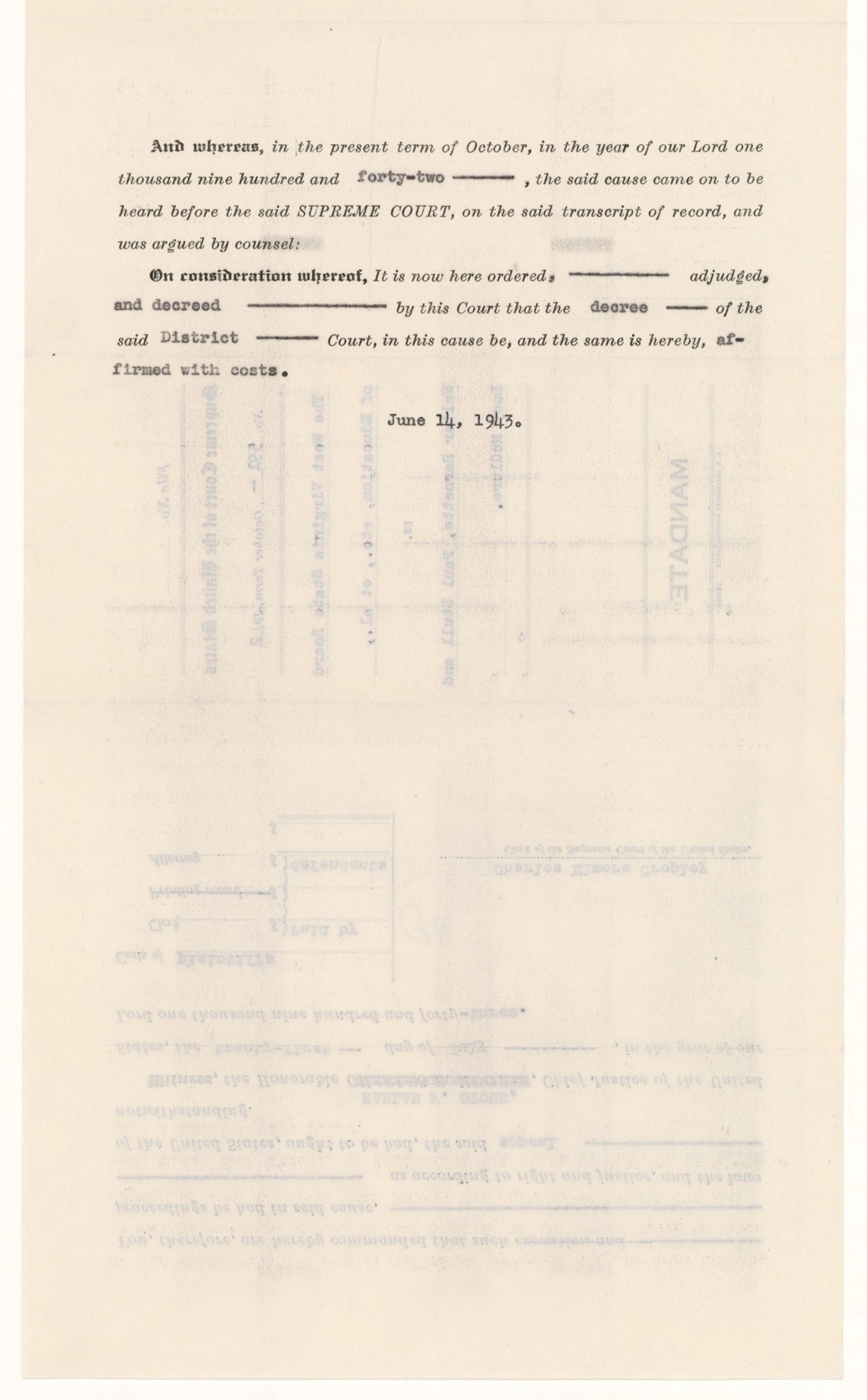
Mandate in West Virginia v. Barnette
Page 4
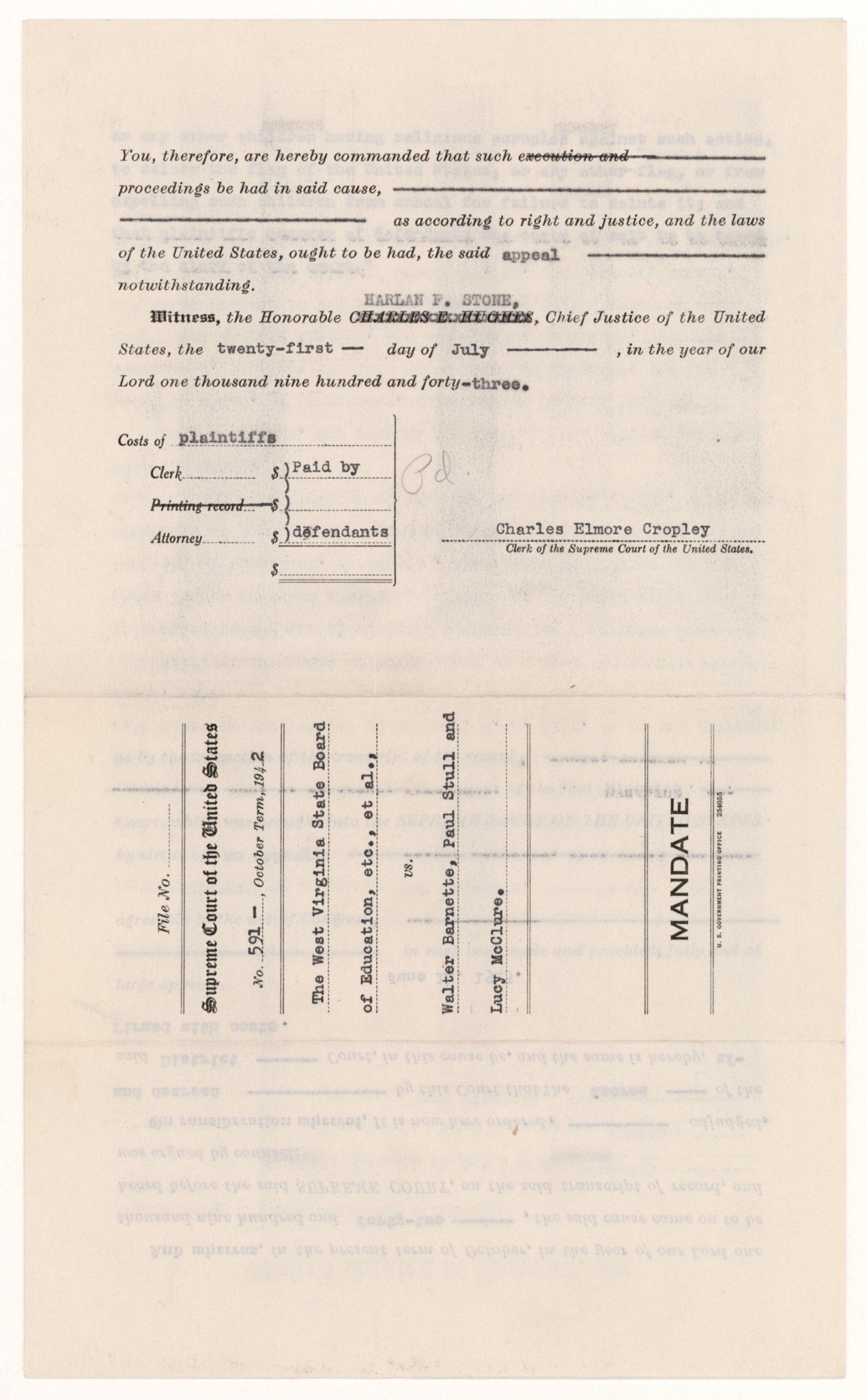
Document
Testimony of John Tinker in Tinker v. Des Moines
7/25/1966
In 1966, a group of public school students in Iowa wore black armbands to school as symbols of mourning and hope for an end to the Vietnam War. John and Mary Beth Tinker and Christopher Eckhart weren’t surprised when they were suspended—the school had just created a policy banning the armbands. But they did not expect that their case would result in a landmark Supreme Court decision. In 1969 the Supreme Court ruled that students don’t "shed their constitutional rights to freedom of speech or expression at the schoolhouse gate."
This is a record of John Tinker’s testimony in the appeal of the district court's decision. Although the appeals court upheld the school’s rule banning the armbands, the Supreme Court ultimately ruled that fear of disruption was not grounds for barring speech.
This is a record of John Tinker’s testimony in the appeal of the district court's decision. Although the appeals court upheld the school’s rule banning the armbands, the Supreme Court ultimately ruled that fear of disruption was not grounds for barring speech.
This primary source comes from the Records of the Supreme Court of the United States.
National Archives Identifier: 5641613
Full Citation: Testimony of John Tinker in Tinker v. Des Moines; 7/25/1966; Case File for John Tinker v. Des Moines; Appellate Jurisdiction Case Files, 1792 - 2010; Records of the Supreme Court of the United States, ; National Archives Building, Washington, DC. [Online Version, https://docsteach.org/documents/document/testimony-john-tinker, April 20, 2024]Testimony of John Tinker in Tinker v. Des Moines
Page 1
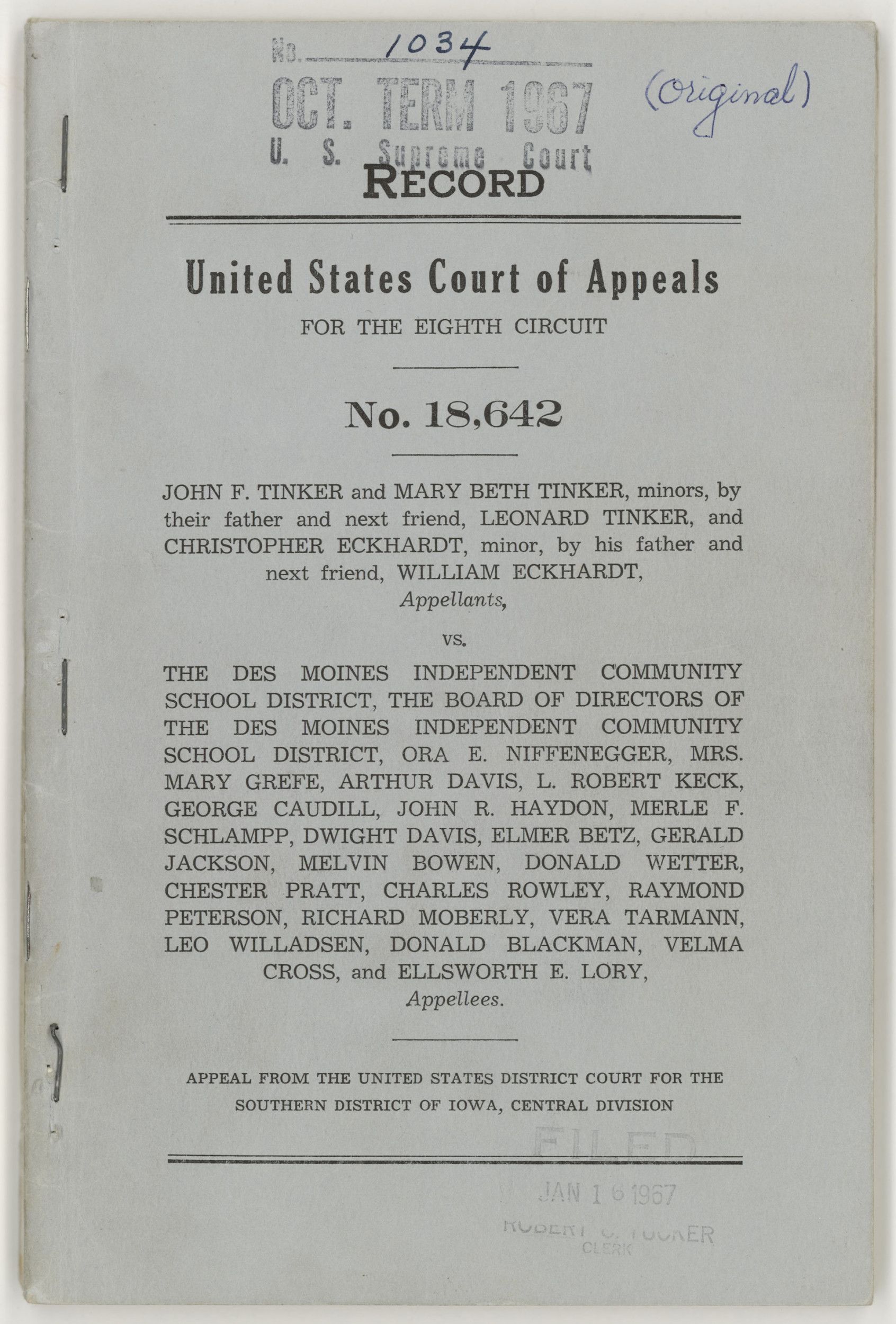
Testimony of John Tinker in Tinker v. Des Moines
Page 2
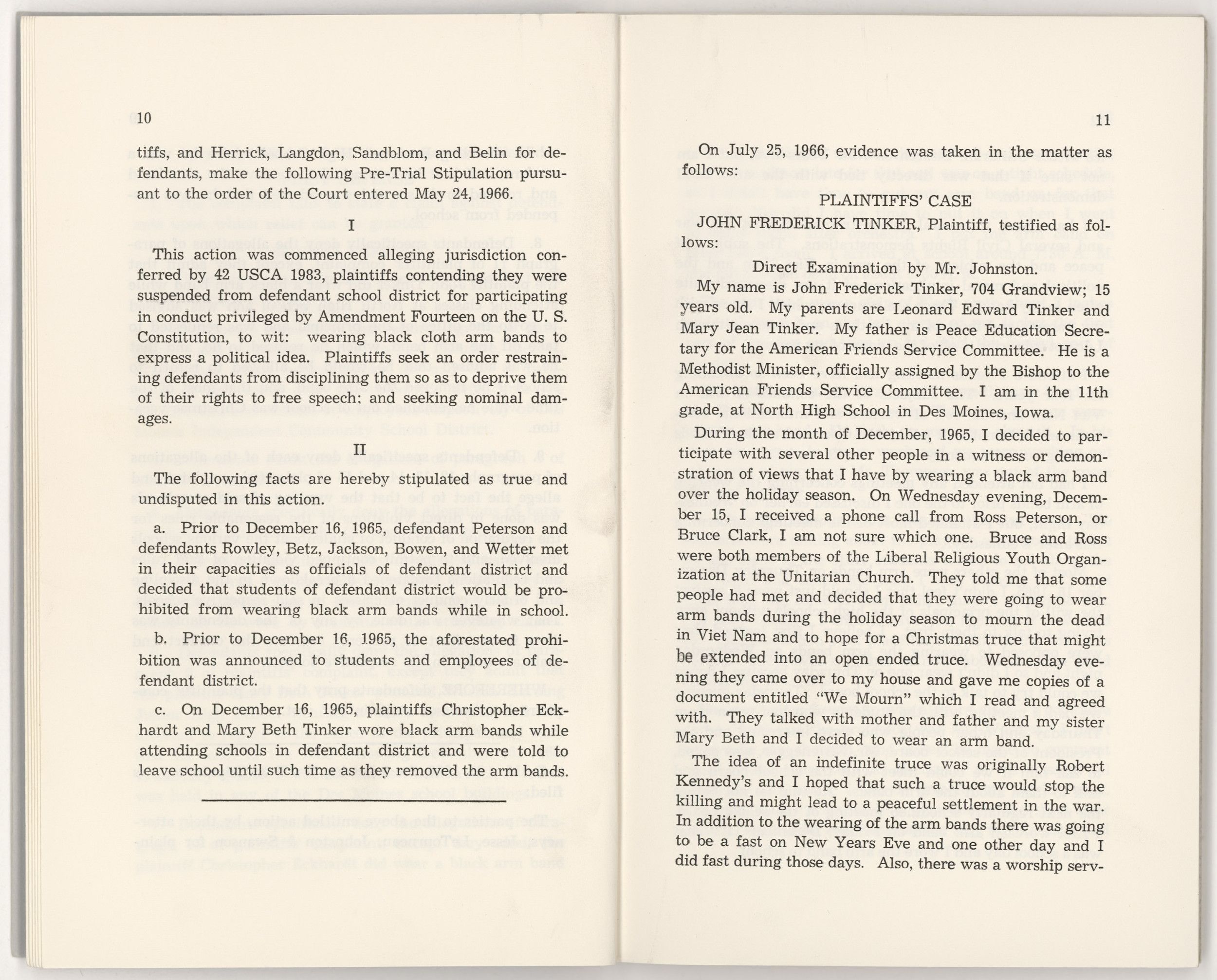
Testimony of John Tinker in Tinker v. Des Moines
Page 3
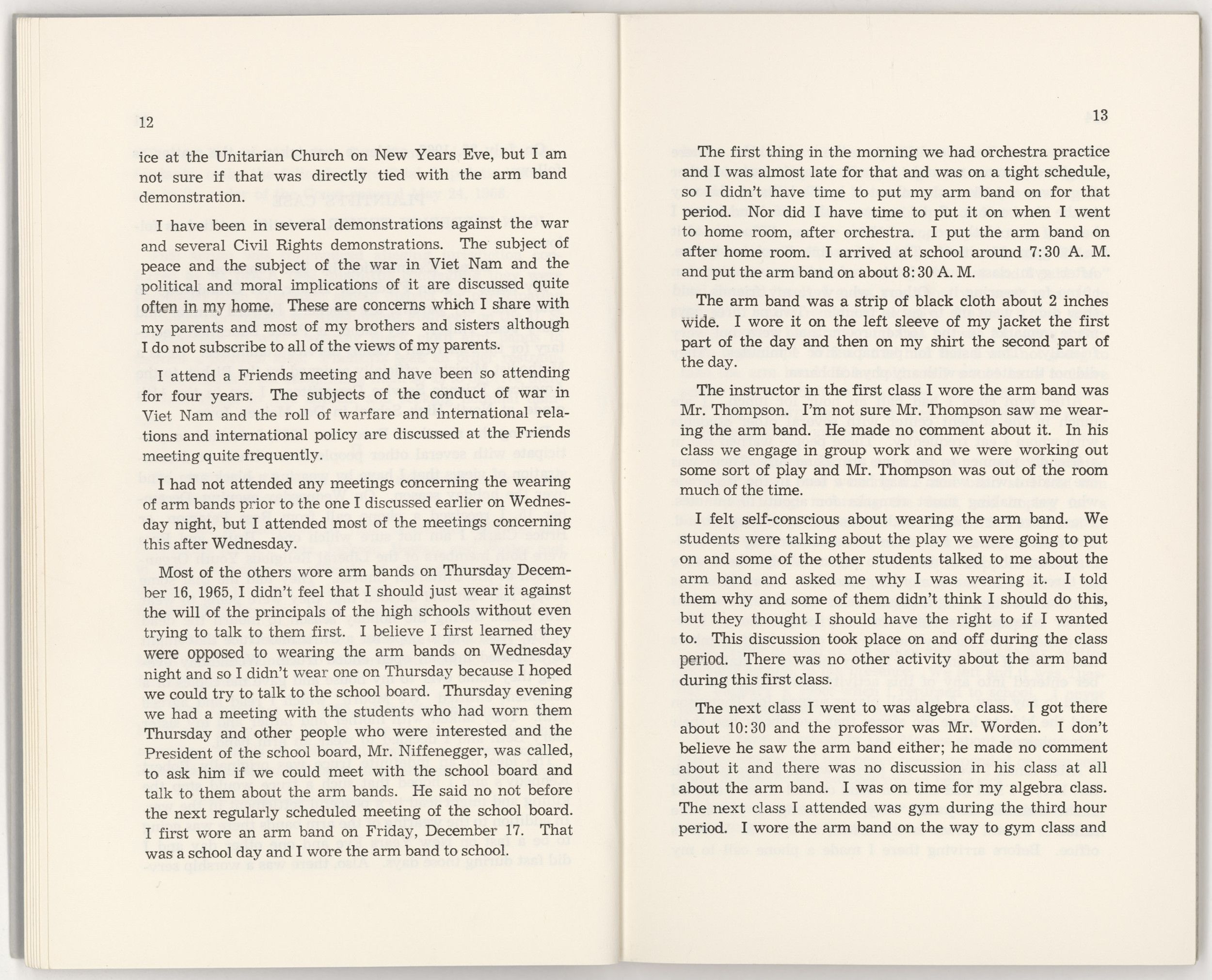
Testimony of John Tinker in Tinker v. Des Moines
Page 4
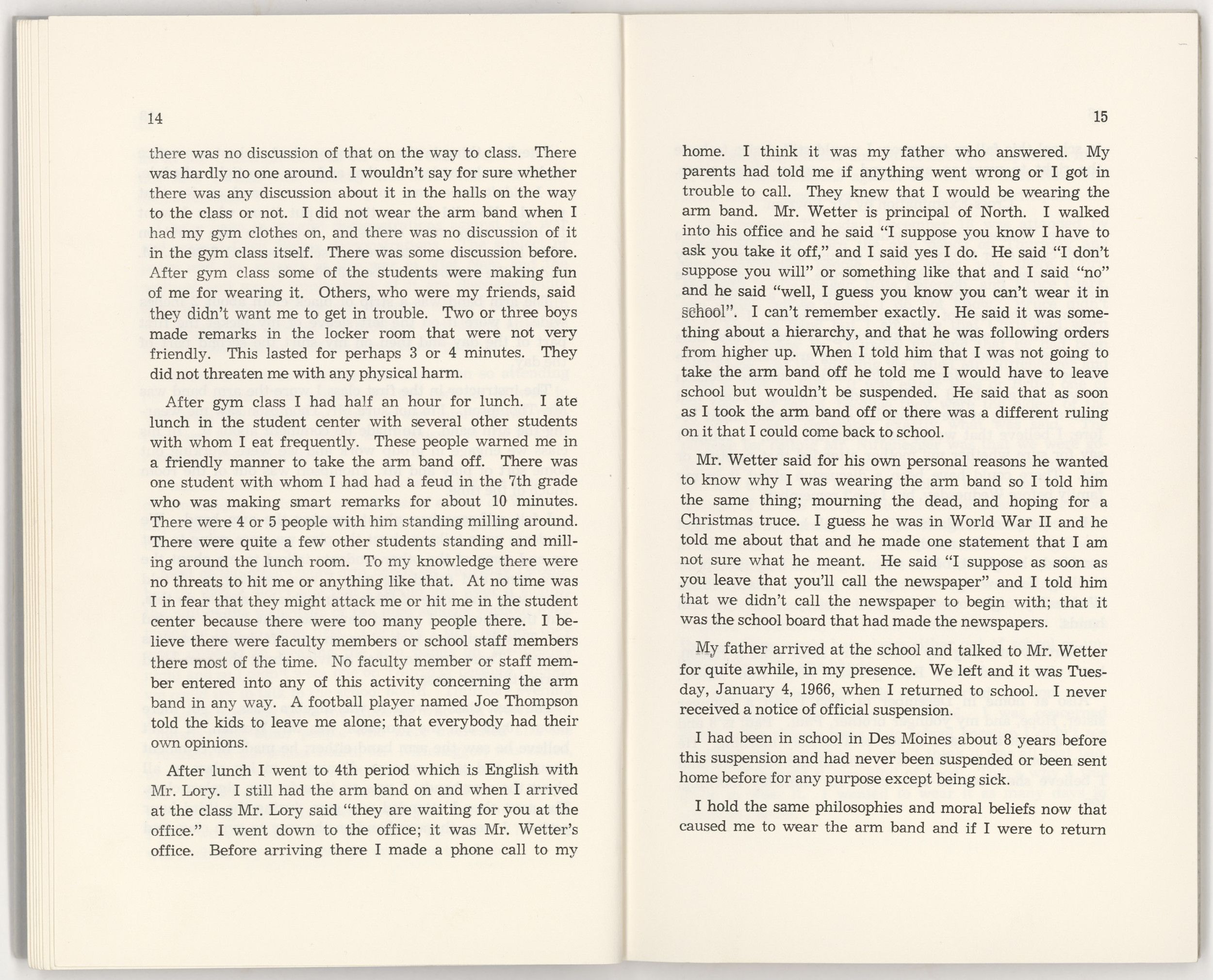
Testimony of John Tinker in Tinker v. Des Moines
Page 5
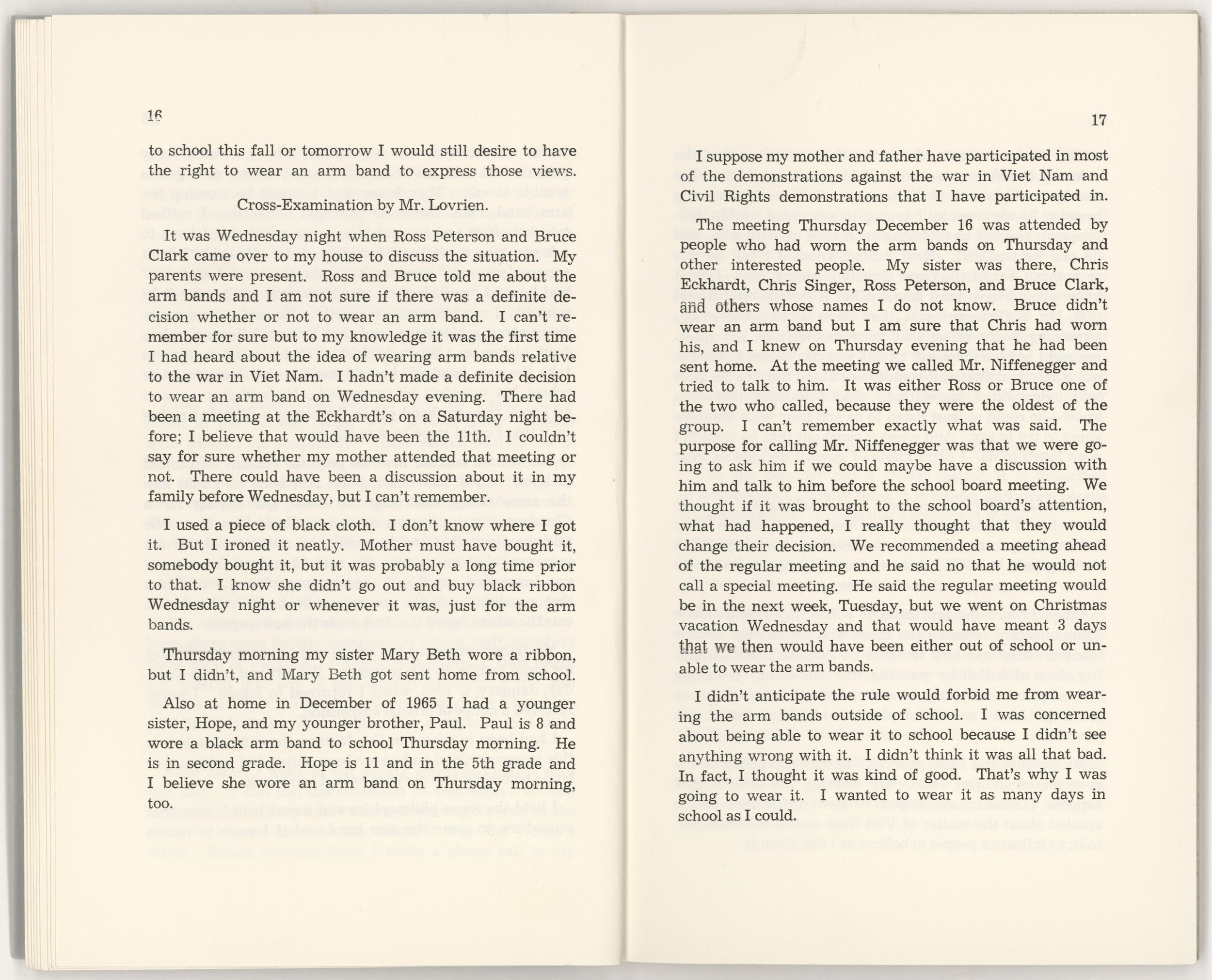
Document
Alien and Sedition Acts of 1798
1798
Passed in preparation for an anticipated war with France, the Alien and Sedition Acts tightened restrictions on foreign-born Americans and limited speech critical of the government.
In 1798, the United States stood on the brink of war with France. The Federalist Party, which advocated for a strong central government, believed that Democratic-Republican criticism of Federalist policies was disloyal and feared that "aliens," or non-citizens, living in the United States would sympathize with the French during a war.
As a result, a Federalist-controlled Congress passed four laws, known collectively as the Alien and Sedition Acts. These laws raised the residency requirements for citizenship from 5 to 14 years, authorized the president to deport "aliens," and permitted their arrest, imprisonment, and deportation during wartime. The Sedition Act made it a crime for American citizens to "print, utter, or publish...any false, scandalous, and malicious writing" about the government.
The laws were directed against Democratic-Republicans, the party typically favored by new citizens. The only journalists prosecuted under the Sedition Act were editors of Democratic-Republican newspapers.
Sedition Act trials, along with the Senate's use of its contempt powers to suppress dissent, set off a firestorm of criticism against the Federalists and contributed to their defeat in the election of 1800, after which the acts were repealed or allowed to expire. The controversies surrounding them, however, provided for some of the first tests of the limits of freedom of speech and press.
In 1798, the United States stood on the brink of war with France. The Federalist Party, which advocated for a strong central government, believed that Democratic-Republican criticism of Federalist policies was disloyal and feared that "aliens," or non-citizens, living in the United States would sympathize with the French during a war.
As a result, a Federalist-controlled Congress passed four laws, known collectively as the Alien and Sedition Acts. These laws raised the residency requirements for citizenship from 5 to 14 years, authorized the president to deport "aliens," and permitted their arrest, imprisonment, and deportation during wartime. The Sedition Act made it a crime for American citizens to "print, utter, or publish...any false, scandalous, and malicious writing" about the government.
The laws were directed against Democratic-Republicans, the party typically favored by new citizens. The only journalists prosecuted under the Sedition Act were editors of Democratic-Republican newspapers.
Sedition Act trials, along with the Senate's use of its contempt powers to suppress dissent, set off a firestorm of criticism against the Federalists and contributed to their defeat in the election of 1800, after which the acts were repealed or allowed to expire. The controversies surrounding them, however, provided for some of the first tests of the limits of freedom of speech and press.
Transcript
FIFTH CONGRESS OF THE UNITED STATES:At the Second Session,
Begun and help at the city of Philadelphia, in the state of Pennsylvania, on Monday, the thirteenth of November, one thousand seven hundred and ninety-seven.
An Act Concerning Aliens.
SECTION 1. Be it enacted by the Senate and the House of Representatives of the United States of America in Congress assembled, That it shall be lawful for the President of the United States at any time during the continuance of this act, to order all such aliens as he shall judge dangerous to the peace and safety of the United States, or shall have reasonable grounds to suspect are concerned in any treasonable or secret machinations against the government thereof, to depart out of the territory of the United Slates, within such time as shall be expressed in such order, which order shall be served on such alien by delivering him a copy thereof, or leaving the same at his usual abode, and returned to the office of the Secretary of State, by the marshal or other person to whom the same shall be directed. And in case any alien, so ordered to depart, shall be found at large within the United States after the time limited in such order for his departure, and not having obtained a license from the President to reside therein, or having obtained such license shall not have conformed thereto, every such alien shall, on conviction thereof, be imprisoned for a term not exceeding three years, and shall never after be admitted to become a citizen of the United States. Provided always, and be it further enacted, that if any alien so ordered to depart shall prove to the satisfaction of the President, by evidence to be taken before such person or persons as the President shall direct, who are for that purpose hereby authorized to administer oaths, that no injury or danger to the United Slates will arise from suffering such alien to reside therein, the President may grant a license to such alien to remain within the United States for such time as he shall judge proper, and at such place as he may designate. And the President may also require of such alien to enter into a bond to the United States, in such penal sum as he may direct, with one or more sufficient sureties to the satisfaction of the per- son authorized by the President to take the same, conditioned for the good behavior of such alien during his residence in the United States, and not violating his license, which license the President may revoke, whenever he shall think proper .
SEC. 2. And be it further enacted, That it shall be lawful for the President of the United States, whenever he may deem it necessary (for the public safety, to order to be removed out of the territory thereof, any alien who mayor shall be in prison in pursuance of this act; and to cause to be arrested and sent out of the United States such of those aliens as shall have been ordered to depart therefrom and shall not have obtained a license as aforesaid, in all cases where, in the opinion of the President, the public safety requires a speedy removal. And if any alien so removed or sent out of the United Slates by the President shall voluntarily return thereto, unless by permission of the President of the United States, such alien on conviction thereof, shall be imprisoned so long as, in the opinion of the President, the public safety may require.
SEC. 3. And be it further enacted, That every master or commander of any ship or vessel which shall come into any port of the United States after the first day of July next, shall immediately on his arrival make report in writing to the collector or other chief officer of the customs of such port, of all aliens, if any, on board his vessel, specifying their names, age, the place of nativity, the country from which they shall have come, the nation to which they belong and owe allegiance, their occupation and a description of their persons, as far as he shall be informed thereof, and on failure, every such master and commander shall forfeit and pay three hundred dollars, for the payment whereof on default of such master or commander, such vessel shall also be holden, and may by such collector or other officer of the customs be detained. And it shall be the duty of such collector or other officer of the customs, forthwith to transmit to the office of the department of state true copies of all such returns.
SEC. 4. And be it further enacted, That the circuit and district courts of the United States, shall respectively have cognizance of all crimes and offences against this act. And all marshals and other officers of the United States are required to execute all precepts and orders of the President of the United States issued in pursuance or by virtue of this act.
SEC. 5. And be it further enacted, That it shall be lawful for any alien who may be ordered to be removed from the United States, by virtue of this act, to take with him such part of his goods, chattels, or other property, as he may find convenient; and all property left in the United States by any alien, who may be removed, as aforesaid, shall be, and re- main subject to his order and disposal, in the same manner as if this act had not been passed.
SEC. 6. And be it further enacted, That this act shall continue and be in force for and during the term of two years from the passing thereof.
Jonathan Dayton, Speaker of the House of Representatives.
TH. Jefferson, Vice President of the United States and President of the Sentate.
I Certify that this Act did originate in the Sentate.
Attest, Sam. A. Otis, Secretary
APPROVED, June 25, 1798.
John Adams
President of the United States.
FIFTH CONGRESS OF THE UNITED STATES:
At the Second Session,
Begun and help at the city of Philadelphia, in the state of Pennsylvania, on Monday, the thirteenth of November, one thousand seven hundred and ninety-seven.
An Act in Addition to the Act, Entitled "An Act for the Punishment of Certain Crimes Against the United States."
SECTION 1. Be it enacted by the Senate and House of Representatives of the United States of America, in Congress assembled, That if any persons shall unlawfully combine or conspire together, with intent to oppose any measure or measures of the government of the United States, which are or shall be directed by proper authority, or to impede the operation of any law of the United States, or to intimidate or prevent any person holding a place or office in or under the government of the United States, from undertaking, performing or executing his trust or duty, and if any person or persons, with intent as aforesaid, shall counsel, advise or attempt to procure any insurrection, riot, unlawful assembly, or combination, whether such conspiracy, threatening, counsel, advice, or attempt shall have the proposed effect or not, he or they shall be deemed guilty of a high misdemeanor, and on conviction, before any court of the United States having jurisdiction thereof, shall be punished by a fine not exceeding five thousand dollars, and by imprisonment during a term not less than six months nor exceeding five years; and further, at the discretion of the court may be holden to find sureties for his good behaviour in such sum, and for such time, as the said court may direct.
SEC. 2. And be it farther enacted, That if any person shall write, print, utter or publish, or shall cause or procure to be written, printed, uttered or published, or shall knowingly and willingly assist or aid in writing, printing, uttering or publishing any false, scandalous and malicious writing or writings against the government of the United States, or either house of the Congress of the United States, or the President of the United States, with intent to defame the said government, or either house of the said Congress, or the said President, or to bring them, or either of them, into contempt or disrepute; or to excite against them, or either or any of them, the hatred of the good people of the United States, or to stir up sedition within the United States, or to excite any unlawful combinations therein, for opposing or resisting any law of the United States, or any act of the President of the United States, done in pursuance of any such law, or of the powers in him vested by the constitution of the United States, or to resist, oppose, or defeat any such law or act, or to aid, encourage or abet any hostile designs of any foreign nation against United States, their people or government, then such person, being thereof convicted before any court of the United States having jurisdiction thereof, shall be punished by a fine not exceeding two thousand dollars, and by imprisonment not exceeding two years.
SEC. 3. And be it further enacted and declared, That if any person shall be prosecuted under this act, for the writing or publishing any libel aforesaid, it shall be lawful for the defendant, upon the trial of the cause, to give in evidence in his defence, the truth of the matter contained in publication charged as a libel. And the jury who shall try the cause, shall have a right to determine the law and the fact, under the direction of the court, as in other cases.
SEC. 4. And be it further enacted, That this act shall continue and be in force until the third day of March, one thousand eight hundred and one, and no longer: Provided, that the expiration of the act shall not prevent or defeat a prosecution and punishment of any offence against the law, during the time it shall be in force.
Jonathan Dayton, Speaker of the House of Representatives.
Theodore Sedgwick, President of the Sentate pro tempore.
I Certify that this Act did originate in the Sentate.
Attest, Sam. A. Otis, Secretary
APPROVED, July 14, 1798
John Adams
President of the United States.
This primary source comes from the General Records of the United States Government.
National Archives Identifier: 5641586
Full Citation: Alien and Sedition Acts of 1798; 1798; Enrolled Acts and Resolutions of Congress, 1789 - 2011; General Records of the United States Government, ; National Archives Building, Washington, DC. [Online Version, https://docsteach.org/documents/document/alien-sedition-acts, April 20, 2024]Alien and Sedition Acts of 1798
Page 1
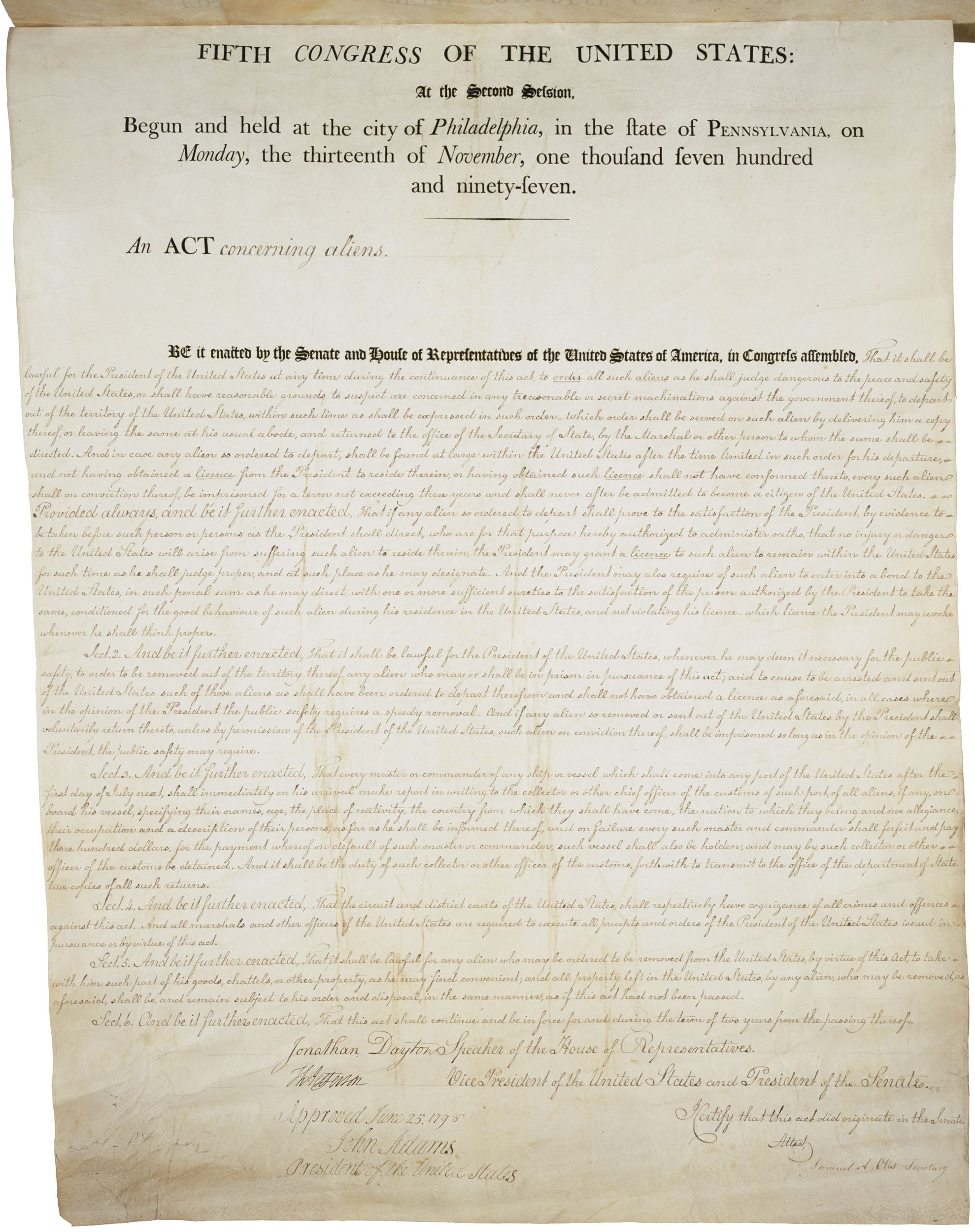
Alien and Sedition Acts of 1798
Page 2
